|
|
|
Jeux
Sans Frontières 1976
European International Series
Entrants
1976:
Belgium (B) • Switzerland (CH) • West Germany (D) •
France (F) • Great Britain (GB) • Italy (I) • Netherlands (NL)
Presenters / Commentators of International Competitions:
Paule Herreman and Michel Lemaire (RTB - B)
Mike Verdrengh (BRT - B)
Georges Kleinmann and Jacques Huwyer (SSR - CH)
Jan Hiermeyer and Heidi Abel (SRG - CH)
Ezio Guidi (TSI - CH)
Erhard Keller, Hartmut Brühl, Karl-Heinz Wocker and Manfred Erdenberger (ARD-WDR
- D)
Guy Lux and Simone Garnier
(A2 - F)
Stuart Hall and Eddie Waring (BBC - GB)
Giulio Marchetti and Rosanna Vaudetti
(RAI - I)
Dick Passchier and Barend Barendse (NCRV - NL)
José Fialho Gouveia (RTP - P)
International
Referees:
Gennaro Olivieri
Guido Pancaldi
National Referees:
Arthur Ellis
(Heats 1, 4 and Final)
and Mike Swann
(Heat 2 onwards)
(GB)
Collaborator / Assistant Referee:
André Lange
Production Credits:
National Games Designers: Paul Trerise and Paul Montague (GB); National Producers: André Lange, Diane Lange and Nicholas Résimont (RTB - B),
Jan Geysen and Guy Wouters (BRT - B),
Jean-Luc Balmer (SSR - CH),
Marius Berger (SRG - CH),
Sergio Cavaglieri (TSI - CH),
Marita Theile (D),
Michel Collignon, Guy Lux and Claude Savarit (F),
Cecil Korer (GB),
Luciano Vecchi (I),
Bernard Prins and Dick van 't Sant (NL), National Directors: Albert Deguelle (RTB - B),
Marco Blaser and Sandro Briner (TSI - CH),
Günther Hassert (D),
Lucien Billard (F),
Geoff Wilson (GB),
Luigi Turolla (I),
Matthias Meuser (NL)
Produced by the European Broadcasting Union and
RTB-BRT (B), SSR-SRG-TSI (CH), ARD-WDR (D),
ANTENNE 2 (F), BBC Manchester (GB), RAI (I), NCRV (NL)
|
Key:
International Heats
●
= Qualified for International Final /
●
= Heat Winner (Silver Trophy)
International Final
●
=
Gold Trophy /
●
=
Silver Trophy /
●
=
Bronze Trophy Trophy
▲ = Promoted to Position / ▼ =
Demoted to Position
DST = Daylight Saving Time
(ONLY France, Great Britain and Italy observed DST) |
|
|
F |
Jeux
Sans Frontières 1976 |
Heat
1 |
|
Event Staged: Wednesday 2nd June 1976
Venue:
Les Arènes de Nîmes (The Arena of Nîmes), Nîmes, France
European Transmissions (Local Timings):
BRT (B): Wednesday 2nd June 1976, 9.05-10.30pm (Live)
SSR (CH): Wednesday 2nd June 1976, 9.05-10.20pm (Live)
SRG (CH): Wednesday 2nd June 1976, 9.05-10.25pm (Live)
TSI (CH): Wednesday 2nd June 1976, 9.05-10.20pm (Live)
WDR 1 (D): Wednesday 2nd June 1976, 9.05-10.30pm (Live)
RAI Due (I): Wednesday 2nd June 1976, 10.05-11.30pm (Live - DST)
Nederland 1 (NL): Friday 4th June 1976, 7.05-8.40pm
RTB (B): Sunday 6th June 1976, 8.30-9.45pm
RTP (P): Saturday 19th June 1976,
9.50-11.30pm
BBC1 (GB): Wednesday 11th August 1976,
7.15-8.30pm
Winners' Trophy presented by: Simone Garnier |
|
Theme:
Ancient Circus Games
|
|
Teams:
Blankenberge (B) v. Huttwil (CH) v. Trostberg (D) v. Nîmes (F) v.
Blackpool (GB) v. Jesolo (I) v. Pijnacker (NL) |
|
Team Members
included:
Blackpool (GB) - Bob Battersby (Team Captain), Brian Bottomley,
Bill Brown, Clive
Burbank, Sharon Hull, Caroline Jenkins, Mike Lomas, Pete Manning, James
Merridew, Deborah Riley, Julian Salanki,
Janina Slusarski, Stuart Thompson, Cheryl Whitham, Ian Witton;
Jesolo (I) - Paulo Scagnetto (Team
Captain), Giorgio Crema (Vice Team Captain), Daniela Alzani, Paolo
Bastianutto, Antonella Bedei, Roberto Cedrelli, Patrizia Cicola, Mauro
Finotto, Wilma Fontana, Egle Maran, Gianni Marchesin, Rodolfo Marigonda,
Manfredo Oliveti, Mauro
Pasquali, Erminio Pieretto, Daniela Scagnetto and Pierantonio Turchetto. |
|
Games: The
Javelin Throwers, The House in Nîmes, The Gladiators (abandoned), Into
the Lions' Den, Return to Egypt, Hannibal’s Elephants, Releasing the
Tigers, The Chariot Race and Discus Throw
(replacement for abandoned Game 3);
Fil Rouge: The Obelisks.
Jokers: Roman Standards. |
|
Game Results and Standings |
|
Games |
|
Team /
Colour |
1 |
2 |
3 |
4 |
5 |
6 |
7 |
FR |
8 |
RES |
Points Scored
(Joker games shown in red) |
|
B |
1 |
1 |
Game void
due to high winds |
--- |
1 |
10 |
1 |
1 |
5 |
6 |
|
CH |
3 |
2 |
4 |
--- |
3 |
12 |
5 |
6 |
5 |
|
D |
10 |
3 |
3 |
6 |
--- |
2 |
7 |
7 |
2 |
|
F |
6 |
6 |
3 |
6 |
4 |
--- |
5 |
3 |
4 |
|
GB |
--- |
5 |
3 |
5 |
1 |
12 |
5 |
2 |
1 |
|
I |
4 |
--- |
5 |
5 |
2 |
12 |
6 |
4 |
3 |
|
NL |
2 |
5 |
6 |
3 |
6 |
12 |
5 |
1 |
--- |
Running Totals
(Leading teams shown in red) |
|
B |
1 |
2 |
2 |
2 |
3 |
13 |
14 |
15 |
20 |
26 |
|
CH |
3 |
5 |
5 |
9 |
9 |
12 |
24 |
29 |
35 |
40 |
|
D |
10 |
13 |
13 |
16 |
22 |
22 |
24 |
31 |
38 |
40 |
|
F |
6 |
12 |
12 |
15 |
21 |
25 |
25 |
30 |
33 |
37 |
|
GB |
0 |
5 |
5 |
8 |
13 |
14 |
26 |
31 |
33 |
34 |
|
I |
4 |
4 |
4 |
9 |
14 |
16 |
28 |
34 |
38 |
41 |
|
NL |
2 |
7 |
7 |
13 |
16 |
22 |
34 |
39 |
40 |
40 |
|
|
|
Result |
Team |
Points |
Final Scoreboard |
|
1st
=2nd
=2nd
=2nd
5th
6th
7th |
I
• Jesolo
● ●
CH • Huttwil
D • Trostberg
NL • Pijnacker
F • Nîmes
GB • Blackpool
B • Blankenberge |
41
40
40
40
37
34
26 |
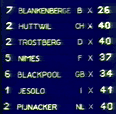 |
|
The Venue |
|
Nîmes, France
This heat
in Nîmes was held in the spectacular Roman Amphitheatre known as Les Arènes
de Nîmes. The building was constructed around 70 AD, and originally a small
neighbourhood developed within its confines, complete with one hundred
landholders and two chapels. At its apex, around 700 denizens (landholders)
lived within the amphitheatre as an enclosed community. The buildings remained
until the eighteenth century and around 1863 it was re-modelled to serve as a
bullring and today is the setting for two annual bullfights. The arena is
elliptical in shape and the central space covers an area of about 130m long by
100m wide. The arena has a capacity of around 16,000 spectators and is ringed
by 34 rows of seating supported by a vaulting construction. Since 1989, it has
been modernised and now has a movable covered roof and heating system, and is
also used to host other public events such as music concerts. |
|
The Games
in Detail |
|
Game 1 - The Javelin Throwers The opening game - ‘The Javelin Throwers’ - involved two members
from each team throwing javelins at four small blocks above a columned
terrace. When the blocks were hit, letters dropped down and when completed,
spelled out JEUX SANS FRONTIÈRES 1976 - a total of 22 letters. To allow for
the six teams to hit four blocks each, a circle () was placed before and
after the word FRONTIÈRES. Just for the record, Belgium had to hit ‘JEUX’, the
Netherlands had ‘SANS’, West Germany had ‘FRO’, France had ‘NTIÈ’,
Switzerland had ‘RES’ and Italy had ‘1976’.
Game 7 - Releasing the Tigers On Game 7 - ‘Releasing the Tigers’ - four teams played their Jokers
and finished it tied in 1st place, each scoring 12 points. On announcing the results/scores, referee Gennaro
Olivieri stated that it was “truly extraordinary for Jeux Sans Frontières
that four teams play their Jokers on the same game and all get 12 pts. This is
a first for Jeux Sans Frontières”. Fortunately, one of those was the
British team of Blackpool!
Fil Rouge - The Obelisks
The Fil Rouge - 'The Obelisks' - featured team players descending a large slide over a pool
whilst attempting to knock down large Egyptian obelisks by means of throwing
balls. An opposing team member dressed as a crocodile hindered their progress
whilst balancing on a beam over the pool. Although the crocodile served very
little purpose it was used to highlight the fact that the crocodile not only
appears on the flag of Nîmes, but also on its coat of arms. |
|
Presenters, Officials and Production Team |
|
This year’s attire for the two main referees, Gennaro Olivieri and Guido
Pancaldi was again a mix and match affair. Shirts and trousers were dark blue
in colour, whilst their jackets were now the more familiar white with dark
blue wide pinstripes. |
|
Returning Teams and Competitors |
|
Italian team members, brother and sister Paolo and Daniela Scagnetto had participated in the programme on
several other occasions. They were both members of the Adria team in 1969 as well as
the Bassano del Grappo team in 1970. They joined fellow team-mate Giorgio Crema
and participated as members of the Jesolo team in 1971 (including the festive
It’s A Christmas Knockout contest), and Paolo participated along with
team-mate Daniela Alzini, as team coaches for the Rosolina Mare squad in 1993.
He returned for a final time as team coach for the Porte Tolle (Donzella) team
in 1994. Daniela (after four attempts in seven years) is finally seen being
presented with the winning trophy at the end of the programme by French
presenter Simone Garnier.
Blackpool player James Merridew had previously featured for the
Lancashire town during their Gold Trophy-winning year of 1971, when he
featured in the domestic heats, the heat in Blackpool and the International
Final. |
|
Looks Familiar? |
|
The elephant costumes used on the fifth game had previously been used at the Thyon
2000 ski resort in the Winter Series earlier in 1976. Although that heat was staged in
Switzerland and this one in France, the Winter series had been a co-production
between both the Swiss and French television services, and all equipment had
been purchased in collaboration. |
|
Additional Information |
|
At the beginning of the programme, presenter Guy Lux reminded the audience
(both in the arena and at home) that France were very proud to be the reigning
Jeux Sans Frontières champions, after French team Nancy’s walkover
victory in 1975.
Due to the excessive high winds, there was some equipment malfunction on Game
3 - ‘The Gladiators’ - which had to be abandoned after the second heat of
three. A replacement game - ‘Discus Throw’ - was added and took place after
the scheduled final game. Dutch team Pijnacker, who were meant to miss Game 3,
were not permitted to compete in the additional game. After the scheduled
final game, they were leading by 2pts, and team members had to watch from the
sidelines as the Italians scored 3pts to snatch the victory.
When the Jokers were presented for play, they were in the form of Roman
Standards and bore the names of the teams playing them. However, when the
Swiss team presented their Joker, the standard had their name written as
‘Huttwill’. This was rather strange because all tracksuits worn by the team
and the main scoreboard itself had it spelt correctly as Huttwil! |
|
Made
in Colour • This programme exists in the BBC Archives
Exists in European archives |
|
|
|
I |
Jeux
Sans Frontières 1976 |
Heat
2 |
|
Event Staged: Wednesday 16th June 1976
Venue:
Palazzo dello Sport (Sports Palace), San Siro, Milano, Italy
European Transmissions (Local Timings):
BRT (B): Wednesday 16th June 1976, 9.05-10.30pm (Live)
SSR (CH): Wednesday 16th June 1976, 9.05-10.25pm (Live)
SRG (CH): Wednesday 16th June 1976, 9.05-10.25pm (Live)
TSI (CH): Wednesday 16th June 1976, 9.05-10.20pm (Live)
WDR 1 (D): Wednesday 16th June 1976, 9.05-10.30pm (Live)
RAI Due (I): Wednesday 16th June 1976, 10.05-11.30pm (Live - DST)
Nederland 1 (NL): Friday 18th June 1976, 7.05-8.40pm
RTB (B): Sunday 20th June 1976, 8.30-9.45pm
RTP (P): Saturday 3rd July 1976,
9.05-10.30pm
BBC1 (GB): Wednesday 18th August 1976,
7.15-8.30pm
Winners' Trophy presented by: Giulio Marchetti |
|
Theme:
Le Olympiadi degli Animali (The Animal Olympiad)
| |
|
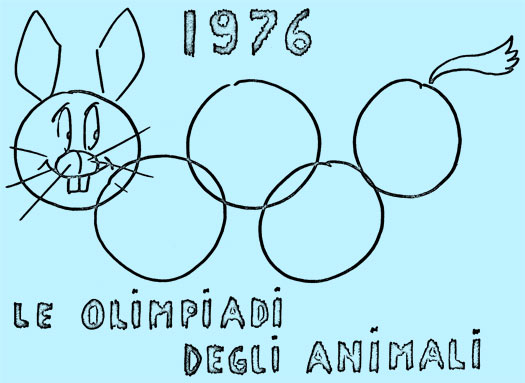 |
|
Image © RAI, 1976 |
| |
|
|
Teams:
Schaerbeek (B) v. Roche (CH) v. Lippstadt (D) v. Toulon (F) v.
Tamworth (GB) v. Bollate (I) v. Weert (NL) |
|
Team Members
included:
Schaerbeek (B) - Rogen Boyard, Daniel Drispian, Dick van Croutuer;
Roche (CH) - Edouard Monot (Team Captain), Gianbert Lanbant,
Patrizia Louisse, Enrico Tolbolgeri;
Lippstadt (D) - Siegfried Behr, Peter Huyer, Peter Müllerin, Monica
Schönbach, Dieter Sobühl, Torpeters Varmhuver, Gunther Werner, Peter Zogel;
Toulon (F) - Marius Bouillabaisse, Dominique Colle, Yves Corden,
Patrick Mattiole, Daniel Pue;
Tamworth (GB) - Geoff Beales (Men’s Team Captain), Barbara ‘Bunny’
Culclough (Women's Team Captain), Stanley Ashmore, Martin Barker, Denise
Battersby, Keith Bowater, Nathalie Bullows, Susan Chappell, Wendy Chappell,
Helen Dale, John Davis, Ralph
Graham, Martin Heafield, Teresa Jones, Ann Lyth, Brian Mandry, Petra Morgan, Stephanie
O'Neal, Michael Pointon, John Sedgwick, Dawn Sewell, Chris Shilton, Jenny
Smale, Steven Walters, Robert Wesley, Sue Wileman;
Bollate (I) - Giovanni Ortolani delle Nave
(Co-Team Coach), Adriano Zasso (Co-Team Coach), Gianluca Azario, Pietro Bassi,
Fabio Bolognesi, Claudio Brazzarola, Patrizio Donati, Cosetta Galletti,
Orianna Girardi, Maria Grazia Piccirillo, Marco Strada, Maria Grazia Taveggia,
Milena Volpi;
Weert (NL) - Mary de Cotte, Tom Danse, Margaret Fröhe, Matthew
Gerres, Jan Reimacher. |
|
Games
(Official Titles): Le Galline (The Chickens), Le Farfalle (The
Butterflies), Gli Arieti... o le Teste Dure (The Rams... or the Hardheads),
La Piovra Gigante (The Giant Octopus), I Trichechi (The Walruses), Gli Orango - Cassius
Clay (The Orangutans), I Trampolieri...con le Gambe Corte (The Stilt-Birds) and
Le Tartarughe... a Ruote (The Tortoises);
Fil Rouge: La Macchina Cattura -Canguri (The Kangaroo-Catching
Vehicle);
Jokers: National Animals. |
|
Game Results and Standings |
|
Games |
|
Team /
Colour |
1 |
2 |
3 |
4 |
5 |
6 |
7 |
FR |
8 |
Points Scored
(Joker games shown in red) |
|
B |
4 |
--- |
6 |
12 |
1 |
3 |
1 |
2 |
5 |
|
CH |
1 |
6 |
--- |
4 |
1 |
2 |
12 |
4 |
7 |
|
D |
3 |
4 |
3 |
--- |
5 |
12 |
4 |
3 |
2 |
|
F |
6 |
3 |
4 |
3 |
--- |
4 |
4 |
5 |
4 |
|
GB |
1 |
5 |
12 |
2 |
1 |
--- |
3 |
2 |
3 |
|
I |
10 |
3 |
2 |
2 |
1 |
1 |
--- |
6 |
6 |
|
NL |
--- |
1 |
1 |
5 |
6 |
10 |
5 |
7 |
1 |
Running Totals
(Leading teams shown in red) |
|
B |
4 |
4 |
10 |
22 |
23 |
26 |
27 |
29 |
34 |
|
CH |
1 |
7 |
7 |
11 |
12 |
14 |
26 |
30 |
37 |
|
D |
3 |
7 |
10 |
10 |
15 |
27 |
31 |
34 |
36 |
|
F |
6 |
9 |
13 |
16 |
16 |
20 |
24 |
29 |
33 |
|
GB |
1 |
6 |
18 |
20 |
21 |
21 |
24 |
26 |
29 |
|
I |
10 |
13 |
15 |
17 |
18 |
19 |
19 |
25 |
31 |
|
NL |
0 |
1 |
2 |
7 |
13 |
23 |
28 |
35 |
36 |
|
|
|
Result |
Team |
Points |
Final Scoreboard |
|
1st
=2nd
=2nd
4th
5th
6th
7th |
CH
• Roche
●
D • Lippstadt
NL • Weert
B • Schaerbeek
F • Toulon
I • Bollate
GB • Tamworth |
37
36
36
34
33
31
29 |
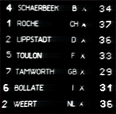 |
|
The Venue |
|
Palazzo dello Sport
The
venue for this heat, the Palazzo dello Sport (Sports Palace), San Siro, Milano
was constructed at a cost of 8.2 billion Italian lire (about £5.15 million in 1976). Building began in
1970 and its inauguration was on 31st January 1976, less than five months
before Jeux Sans Frontières visited. With a capacity for 18,000
spectators, the multi-purpose arena was the largest of its type in the world
and became the home of Olimpia Milano, the city's historic basketball team.
Unfortunately, the building was only in use for nine years as it suffered a
roof collapse in heavy snow on Thursday 17th January 1985. The high tensile steel
cables holding the roof in place suddenly failed under the weight of laying
snow, causing the roof to drop by several metres. Despite attempts to melt the
snow (which unfortunately exacerbated the problems), the roof reportedly
buckled and collapsed under an estimated 800 tonnes of snow. In the following
three years, the structure was inexplicably left to rot with no reparatory
work undertaken.
Exposed to the elements, the building deteriorated to the point that there was
no alternative but demolition. The area is now covered by a small forest and
is cordoned off from public access. |
|
The Games
in Detail |
|
Game 1 - Le Galline (The Chickens)
The first game - 'Le Galline (The Chickens)' - was played over
five elimination rounds by six of
the seven teams (with the Dutch sitting it out). Two male and one female
competitors and their Team
Captain participated. The chickens run and lay their eggs on a special slope
which establishes and order of precedence. The chicken which lays its egg last
is eliminated each time. The game's fifth and final round determined the winning
team.
| |
|
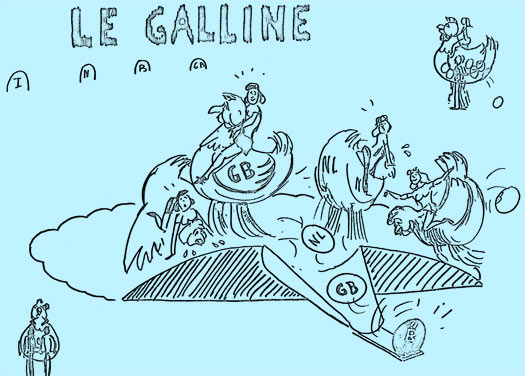 |
|
Image © RAI, 1976 |
| |
|
Running Scores and Positions:
1st Bollate (I) (10pts awarded
/ Joker / 10pts total)
2nd Toulon (F) (6pts / 6pts)
3rd Schaerbeek (B) (4pts / 4pts)
4th Lippstadt (D) (3pts / 3pts)
=5th Roche (CH) (1pt / 1pt)
=5th Tamworth (GB) (1pt / 1pt)
7th Weert (NL) (--- / 0pts) |
Game 2 - Le Farfalle (The Butterflies)
The second game - 'Le Farfalle (The Butterflies)' - was played by six of the seven teams (with
the Belgians taking a breather) over the course of three heats which featured
two teams each. One female competitor from each team was launched from ground
to level up to a height of some 6 metres (19.7ft) above a large canvas
'flower' by means of a rope and pulley system operated by team mates. The idea
of the game was that the female competitors had to catch 'pollen' (represented
by balloons) that were launched into the air from the flower, with her
movement controlled by the team mates on the ground. Once caught, the balloons
had to be collected in a long thin net that they carry. The team catching
netting the greater number of balloons within the time limit would
be declared the winner.
| |
|
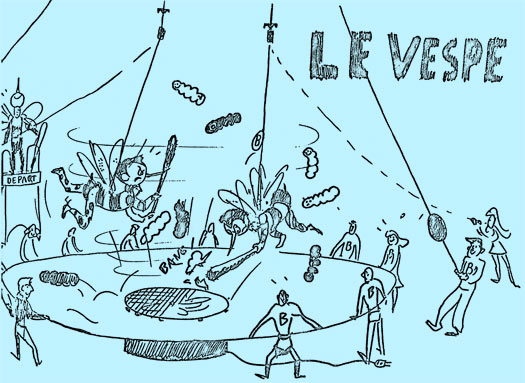 |
|
Image © RAI, 1976 |
| |
|
Running Scores and Positions:
1st Bollate (I) (3pts awarded
/ 13pts total)
2nd Toulon (F) (3pts / 9pts)
=3rd Roche (CH) (6pts / 7pts) ▲
=3rd Lippstadt (D) (4pts / 7pts) ▲
5th Tamworth (GB) (5pts / 6pts)
6th Schaerbeek (B) (--- / 4pts) ▼
7th Weert (NL) (1pt / 1pt) |
|
Comments: This game was originally going to involve wasps rather than
butterflies and would have been titled 'Le Vespe (The Wasps)', hence its
somewhat misleading illustration in the games information booklet for this
event. Referee Mike Swann's annotations in his copy of this document
suggests that the change was decided upon in the days immediately before
the recording. This would have necessitated either the hurried creation of
butterfly costumes or their being sourced from the RAI costume store.
Additionally, this was planned as Game 3
but was moved in the running order to become the second game played on the
night.
It must be said that this game looked
somewhat precariously staged, and not for anyone suffering from vertigo! |
Game 3 - Gli Arieti... o le Teste Dure (The Rams... or the Hardheads)
The third game - 'Gli Arieti... o le Teste Dure (The Rams... or the Hardheads)' - was played by
three male competitors from each of the competing teams, one of whom was in
costume as a ram. The ram, at each round, has to break a sheet of fake marble,
which with each round gets thicker. If the ram does not succeed in breaking
through or if one of the assistants who holds up the sheet is pushed away from
the proper position (on rollers), then his team is eliminated. A time limit
was applied and a pile of boxes added to give the players a soft landing. The
competitor breaking through the thickest sheet of marble would win the game
for his team.
| |
|
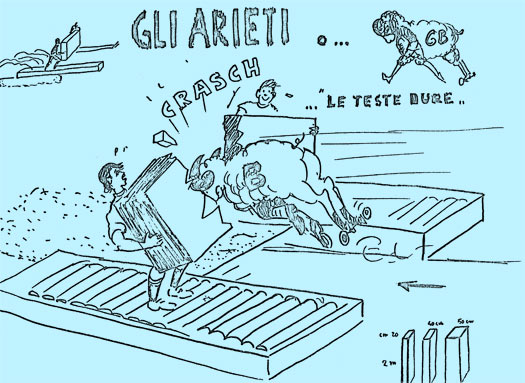 |
|
Image © RAI, 1976 |
| |
|
Running Scores and Positions:
1st Tamworth (GB) (12pts awarded / Joker /
18pts total) ▲
2nd Bollate (I) (2pts
/ 15pts) ▼
3rd Toulon (F) (4pts / 13pts) ▼
=4th Schaerbeek (B) (6pts / 10pts) ▲
=4th Lippstadt (D) (3pts / 10pts) ▼
6th Roche (CH) (--- / 7pts) ▼
7th Weert (NL) (1pt / 2pts) |
|
Comments: This game was originally planned as Game 2 but was moved in
the running order to become the third game played on the night.
|
Game 4 - La Piovra Gigante (The Giant Octopus)
The fourth game - 'La Piovra Gigante (The Giant Octopus)' - was played by six of the
seven teams (with the Germans taking time out).
|
Running Scores and Positions:
1st Schaerbeek (B) (12pts awarded / Joker /
22pts total) ▲
2nd Tamworth (GB) (2pts / 20pts) ▼
3rd Bollate (I) (2pts
/ 17pts) ▼
4th Toulon (F) (3pts / 16pts) ▼
5th Roche (CH) (4pts / 11pts) ▲
6th Lippstadt (D) (--- / 10pts) ▼
7th Weert (NL) (5pts / 7pts) |
|
Comments:
After the fourth game, Belgian team Schaerbeek were leading the competition
with 22pts, followed by British team Tamworth with 20 pts. However, following
on from the previous game when the British team had themselves been leading
the contest, the scoreboard operators completely overlooked the fact that the
Belgian team had overtaken them after the fourth game and they continued to
‘flash’ the name of the British team, even though the scoreboard showed the
Belgian team’s positional number as 1st and the British team’s as 2nd!
We are unable to present an illustrative
cartoon for this game as details of Game 4 are not included in the
surviving games information booklet that we have access to. |
Game 5 - I Trichechi (The Walruses)
The fifth game - 'I Trichechi (The Walruses)' - was played by six of the seven teams
(with the French enjoying a break) and involved three male competitors from
each team. An enormous but light ball comes down from the ceiling towards the
centre of a large round carpet. The two team mates of the male competitor in
the walrus costume are more mobile than he is and were to help him in the
game. On the whistle, in a time of one minute and 30 seconds, the walrus had
to touch the ball as many times as possible before it falls on the ground or
goes outside the game area. The team with the greater number of ball touches
in limit time would be declared the winner.
| |
|
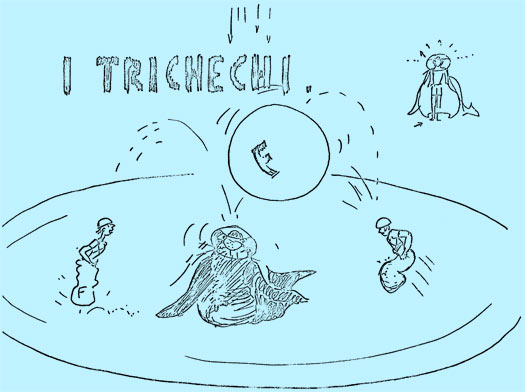 |
|
Image © RAI, 1976 |
| |
|
Running Scores and Positions:
1st Schaerbeek (B) (1pts awarded / 23pts
total)
2nd Tamworth (GB) (1pt / 21pts)
3rd Bollate (I) (1pt
/ 18pts)
4th Toulon (F) (--- / 16pts)
5th Lippstadt (D) (5pts / 15pts) ▲
6th Weert (NL) (6pts / 13pts) ▲
7th Roche (CH) (1pt / 12pts) ▼ |
Game 6 - Gli Orango - Cassius Clay (The Orangutans)
The sixth game - 'Gli Orango - Cassius Clay (The Orangutans)' - featured the giant
apes and was played out over three
one-minute rounds. The idea of the game was that each orangutan had to swing
their arms to make contact with his adversary’s mouth. After the three rounds,
the lowest-scoring teams fought it out together in a three-way boxing match
for the bottom three places in the game. This saw Italy being matched against
Belgium and Switzerland, and from the whistle of the two-minute match, it was
clear that the Belgians and Swiss had a tactical plan to attack the Italian
gorilla and to leave each other alone. When it became apparent to the home
crowd as to what was occurring, a hail of boos and whistles rang out around
the whole arena for the entire bout!
| |
|
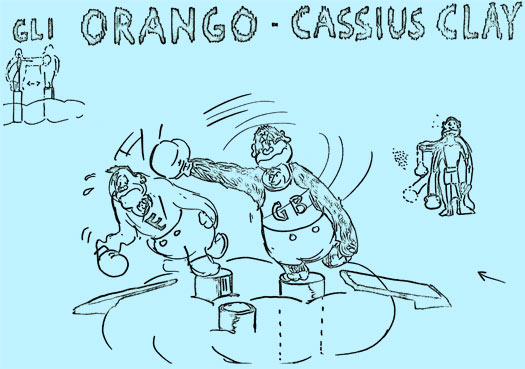 |
|
Image © RAI, 1976 |
| |
|
Running Scores and Positions:
1st Lippstadt (D) (12pts awarded / Joker /
27pts total) ▲
2nd Schaerbeek (B) (3pts / 26pts) ▼
3rd Weert (NL) (10pts / Joker / 23pts) ▲
4th Tamworth (GB) (--- / 21pts) ▼
5th Toulon (F) (4pts / 20pts) ▼
6th Bollate (I) (1pt
/ 19pts) ▼
7th Roche (CH) (2pts / 14pts) |
Game 7 - I Trampolieri...con le Gambe Corte (The Stilt-Birds)
The seventh and penultimate game - 'I Trampolieri...con le
Gambe Corte (The Stilt-Birds)' - as played by six
of the seven teams (with the Italians taking their turn to sit on the
sidelines) over the course of two heats which featured three teams each. Each
team fielded one male and one female competitor, with team captains also
involved.
| |
|
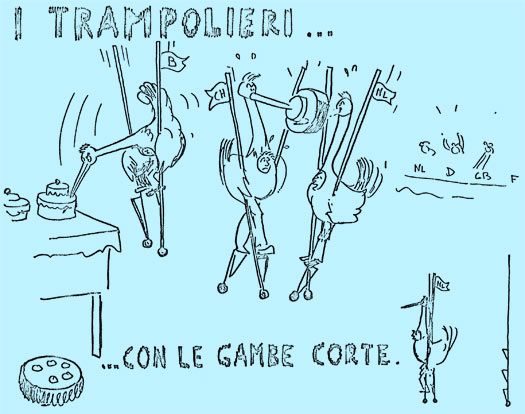 |
|
Image © RAI, 1976 |
| |
|
Running Scores and Positions:
1st Lippstadt (D) (4pts awarded / 31pts
total)
2nd Weert (NL) (5pts / 28pts) ▲
3rd Schaerbeek (B) (1pt / 27pts) ▼
4th Roche (CH) (12pts / Joker / 26pts) ▲
=5th Toulon (F) (4pts / 24pts) ▼
=5th Tamworth (GB) (3pts / 24pts) ▼
7th Bollate (I) (---
/ 19pts) ▼ |
Fil Rouge - La Macchina Cattura -Canguri
(The Kangaroo-Catching Vehicle)
The Fil Rouge in this event - 'La Macchina Cattura -Canguri (The
Kangaroo-Catching Vehicle)' - was played individually over
seven heats, with each country fielding one male competitor dressed as a
kangaroo, with opposing team members operating the machine of the game title.
The kangaroo had to pick up as many Olympic medals as possible along the
stadium's running track. On the whistle, the kangaroo escapes and the game
begins, the machine setting off in pursuit. The team picking the most medals
and evading capture for the longest time would be declared the winner.
| |
|
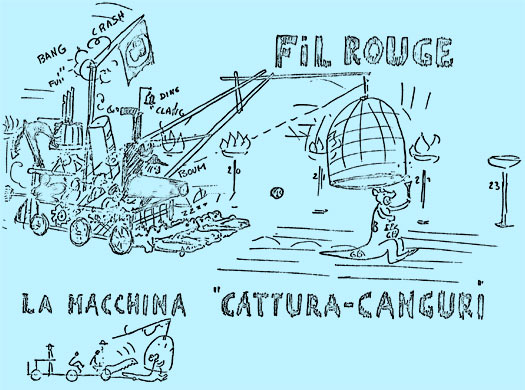 |
|
Image © RAI, 1976 |
| |
|
Final Fil Rouge Standings:
1st Weert (NL)
2nd Bollate (I)
3rd Toulon (F)
4th Roche (CH)
5th Lippstadt (D)
=6th Schaerbeek (B)
=6th Tamworth (GB) |
|
Running Scores and Positions:
1st Weert (NL) (7pts awarded / 35pts total)
▲
2nd Lippstadt (D) (3pts / 34pts) ▼
3rd Roche (CH) (4pts / 30pts) ▲
=4th Schaerbeek (B) (2pts / 29pts) ▼
=4th Toulon (F) (5pts / 29pts) ▲
6th Tamworth (GB) (2pts / 26pts) ▼
7th Bollate (I) (6pts
/ 25pts) |
Game 8 - Le Tartarughe... a Ruote (The Tortoises)
The eighth and final game - 'Le Tartarughe... a Ruote (The
Tortoises)' - was played in unison
by all seven teams. Each team fielded two competitors (one female, one male)
on this game, though eventually some other team members became involved. The
first team to score a balloon will win the game.
| |
|
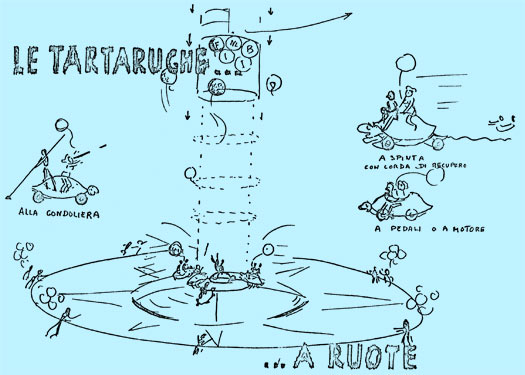 |
|
Image © RAI, 1976 |
| |
|
Final
Scores and Positions:
1st Roche (CH) (7pts awarded / 37pts total)
▲
=2nd Lippstadt (D) (2pts / 36pts)
=2nd Weert (NL) (1pt / 36pts) ▼
4th Schaerbeek (B) (5pts / 34pts)
5th Toulon (F) (4pts / 33pts) ▼
6th Bollate (I) (6pts
/ 31pts) ▲
7th Tamworth (GB) (1pt / 27pts) ▼ |
|
Comments:
As was the case with their national rivals Pijnacker in the previous heat, the
Dutch team of Weert were leading on the scoreboard before the final game.
Ahead of West German team Lippstadt by 4pts and the Swiss team of Roche by
5pts, the team really blew their chances of winning the heat simply because a
female competitor was unable to judge directing a balloon into a cage above
her head. The Swiss competitor scored a hit on her first attempt and took the
7pts, closely followed by the Italians. The two eading teams came in sixth
and seventh place on the game and quite literally handed the trophy to the
Roche team. |
|
|
Presenters, Officials and Production Team |
|
British commentator Eddie Waring was always renowned in the programme for his
spoonerisms of reversing letters when announcing the names of other European
teams. Throughout this heat it seemed that West German commentator Manfred
Erdenberger had the same problem, when he continuously referred to the Italian
team of Bollate as Bottale instead! |
|
Team
Personnel |
|
Italian co-team coach Giovanni Ortolani delle Nave earned
himself the nickname "The Spaghetti Kid" among the commentators because
of his love of spaghetti. At each of the meal times during the four
days in Milano, all he would eat was spaghetti (even at breakfast)! |
|
Returning
Teams and Competitors |
|
The Swiss team of Roche, a town with a population of just 800 people, is the
smallest town ever to win a Jeux Sans Frontières heat. Roche would later play host to 1978's
non-televised
Jeux Sans
Frontières de Souvenir, which was a special event reuniting
three of the teams from this event (Roche, Schaerbeek and Toulon) along with
other JSF teams from West Germany, Italy and the Netherlands that had
previously competed on Swiss soil. |
|
Records
and Statistics |
|
This heat was the closest ever finish between all seven teams in the
history of Jeux Sans Frontières. With only eight points separating all
the teams, the Swiss team from Roche scored the lowest ever points win (37) in
this current formula, and jointly hold the record (with La Clusaz - 1998 JSF
Heat 4) for winning with the lowest percentage of available points - barely
66% (37 out of a possible 56). The competition was also unusual in that 6 of
the 7 teams at one point held the lead on the night (the exception being the
French team from Toulon). |
|
Additional Information |
|
This was the third and final indoor summer Jeux Sans
Frontières heat ever staged - the first two being at the Ahoy Stadium in
Rotterdam, Netherlands in 1971 and the Allmend Ice Stadium in Bern,
Switzerland in 1972.
With games designed by Adolfo 'Popi' Perani, this was one of the most
spectacular heats in the history of Jeux Sans Frontières. With
fantastically lifelike costumes, this heat had a Fil Rouge which involved
catching kangaroos and games featuring rams, octopuses and tortoises. The most memorable game of the heat
was that featuring giant orangutans in a boxing match. Of course, British
commentator Stuart Hall could not contain himself, and was in hysterics. |
|
Made
in Colour • This programme exists in the BBC Archives
Exists in European archives |
|
|
|
CH |
Jeux
Sans Frontières 1976 |
Heat
3 |
|
Event Staged: Wednesday 23rd June 1976
Venue:
Piazza Lago e Riva del Lago Lugano (Lakeside Square and Shore of Lake
Lugano),
Caslano Malcantone, Switzerland
European Transmissions (Local Timings):
BRT (B): Wednesday 23rd June 1976, 9.05-10.30pm (Live)
RTB (B): Sunday 27th June 1976, 8.30-9.45pm
SSR (CH): Wednesday 30th June 1976, 9.05-10.20pm
SRG (CH): Wednesday 30th June 1976, 9.05-10.20pm
TSI (CH): Wednesday 30th June 1976, 9.05-10.20pm
WDR 1 (D): Wednesday 30th June 1976, 9.05-10.30pm
RAI Due (I): Thursday 1st July 1976
Nederland 1 (NL): Saturday 3rd July 1976, 7.05-8.40pm
RTP (P): Saturday 24th July 1976,
10.10-11.30pm
BBC1 (GB): Wednesday 25th August 1976,
7.15-8.30pm
Winners' Trophy presented by: Mayor of Caslano |
|
Theme:
Tutti in Vacanza (Everyone on Holiday)
| |
|
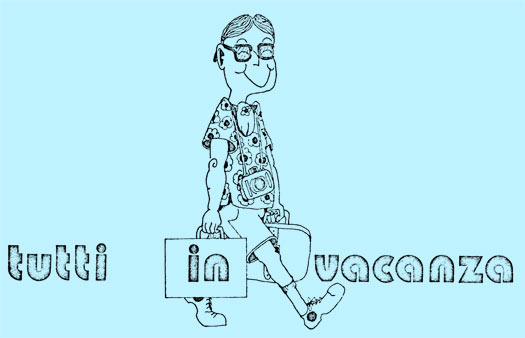 |
|
Image © TSI, 1976 |
| |
|
|
Teams:
Wezembeek-Oppem (B) v. Caslano Malcantone (CH) v. Birkenfeld (D) v.
Arbois (F) v. Newbury (GB) v. Amalfi (I) v. Zutphen (NL) |
|
Games Demonstration Team: Riva San Vitale (CH) |
|
Team Members
included:
Wezembeek-Oppem (B) - Eddy Suderiks;
Caslano Malcantone (CH) - Sergio Antonietti (Team Captain), Renzo
Antonietti, Mirko Ballinari, Kristina Brandt, Brooky Brown, Maria Caraluggia, Daniela Cleis,
Heinrich Eimark, Renato Giobelli,
Angelo Monti, Roberto Monti, Elde Robiani, Maria Chiara Ruggia, Mauro Trezzini;
Birkenfeld (D) - Wolfgang Beiren, Else Boitler, Werner Deser, Heike Füchs, Arnaud
Glückner, Annalena Hartmann, Arnaud Leonardt, Marianna Schneider, Werner
Schneider, Karl-Heinz Schrammer, Karen Schultz, Reinholt Selle;
Arbois (F) - Françoise Joerli;
Newbury (GB) - John Norgate (Team Manager), Mike Hart (Team Coach
and Men’s Team Captain), Sue Robertson (Women's Team Captain), John Bauer,
Hilary Bowden, Timothy Cornish, Susan Grantham, Paul Heggis, Julian Hendy,
Melvin Kastelnik, Rachel King, Mark Morris, Louise O’Neill, John Rice, Wenda
Rice, Alisdair Ross, Douglas Smith, Richard Smith, Colin Street, Moyna Turner;
Amalfi (I) - Livio Amandolla, Giorgio Fimandola, Annamaria
Ristolli, Patrizia Torra;
Zutphen (NL) - Paul Jannsen, Hans Kuyper, Barbara Pieters, Ann
Smarks. |
|
Games
(Official Titles): Holidays at the Grand Hotel, Golf with Surprise,
Holidays in a Caravan, Fishing with Push,
Hitch-Hiking, Picnic on the Mountain, An Ice-Cream for the Miss and Universal
Ski... It's A Knockout Version;
Fil Rouge: Holidays on the Island;
Jokers: Jolly 'Ticino' Jokers. |
|
Game Results and Standings |
|
Games |
|
Team /
Colour |
1 |
2 |
3 |
4 |
5 |
6 |
7 |
FR |
8 |
Points Scored
(Joker games shown in red) |
|
B |
8 |
6 |
3 |
1 |
3 |
--- |
2 |
7 |
1 |
|
CH |
6 |
2 |
5 |
6 |
12 |
1 |
--- |
4 |
7 |
|
D |
--- |
5 |
4 |
4 |
4 |
5 |
4 |
2 |
4 |
|
F |
2 |
--- |
3 |
2 |
8 |
3 |
6 |
6 |
6 |
|
GB |
5 |
3 |
--- |
12 |
5 |
5 |
5 |
6 |
5 |
|
I |
3 |
5 |
12 |
--- |
1 |
2 |
3 |
4 |
3 |
|
NL |
2 |
1 |
3 |
3 |
--- |
12 |
1 |
1 |
1 |
Running Totals
(Leading teams shown in red) |
|
B |
8 |
14 |
17 |
18 |
21 |
21 |
23 |
30 |
31 |
|
CH |
6 |
8 |
13 |
19 |
31 |
32 |
32 |
36 |
43 |
|
D |
0 |
5 |
9 |
13 |
17 |
22 |
26 |
28 |
32 |
|
F |
2 |
2 |
5 |
7 |
15 |
18 |
24 |
30 |
36 |
|
GB |
5 |
8 |
8 |
20 |
25 |
30 |
35 |
41 |
46 |
|
I |
3 |
8 |
20 |
20 |
21 |
23 |
26 |
30 |
33 |
|
NL |
2 |
3 |
6 |
9 |
9 |
21 |
22 |
23 |
24 |
|
|
|
Result |
Team |
Points |
Final Scoreboard |
|
1st
2nd
3rd
4th
5th
6th
7th |
GB
• Newbury
● ●
CH • Caslano Malcantone
F • Arbois ●
I • Amalfi
D • Birkenfeld
B • Wezembeek-Oppem
NL • Zutphen |
46
43
36
33
32
31
24 |
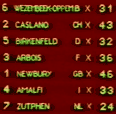 |
|
The Venue |
|
Caslano Malcantone,
Switzerland
This heat was held on a small piazza on the waterfront of Lake Lugano, with a
stunning backdrop of snow-capped mountains. Although only a town with a
population of about 2,000 inhabitants at the time, its numbers swelled by
roughly 50% at the height of the summer season with tourists being lured
globally to admire the beautiful alpine scenery and lakeside views. |
|
The Games
in Detail |
|
Game 1 - Holidays at the Grand Hotel
The first game - 'Holidays at the Grand Hotel' - was played by six of
the seven teams (with the Germans sitting it out). One female and two males
competitors participated. It is holiday time. The hotels are already booked
out and the staff has a lot to do. Beyond the revolving door, there is a
supply of trays, glasses and drinks, ready to serve all competitors. The
waiters must serve at their own table as many trays and drinks as possible.
The difficulty of the game consists in the fact that, coming out of the
revolving door there is a footbridge to pass over and to do this the waiters
have to find the right moment, otherwise they fall into water and the 'load'
gets lost. One waiter is thin. The other one has a costume that makes him look
very fat. Time limit: 2 minutes.
| |
|
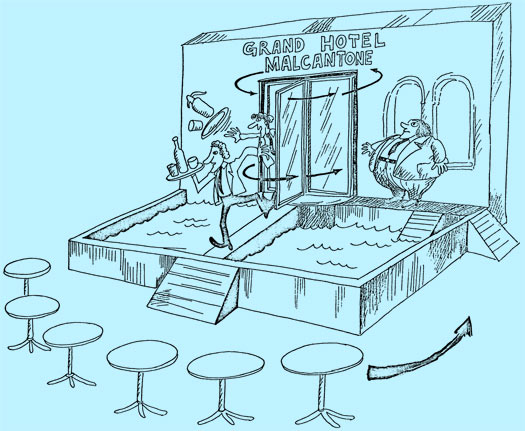 |
|
Image © TSI, 1976 |
| |
|
Running Scores and Positions:
1st Wezembeek-Oppem (B) (8pts awarded
/ Joker / 8pts total)
2nd Caslano Malcantone (CH) (6pts / 6pts)
3rd Newbury (GB) (5pts / 5pts)
4th Amalfi (I) (3pts / 3pts)
=5th Arbois (F) (2pts / 2pts)
=5th Zutphen (NL) (1pt / 1pt)
=7th Birkenfeld (D) (--- / 0pts) |
Game 2 - Golf with Surprise
The second game - 'Golf with Surprise' - was played by six of the seven teams (with
the French taking a breather). Among the facilities offered by a first class
summer resort, a golf course is of course a must, yet it can hold surprises
for the tourist... The competitor has 2 minutes to putt 20 balls towards the
holes on a gentle incline under which, in a tunnel, there are two moles
(opposition team members). These will try to guess at which hole the ball will
arrive and consequently pop up to fill that hole, stopping the ball from
dropping into it. However, to guess the correct hole, the mole needs to
surface through one of the holes to see and if they choose wrong, they will
need to quickly move to another hole.
| |
|
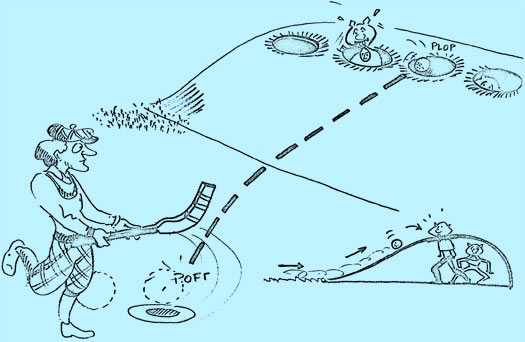 |
|
Image © TSI, 1976 |
| |
|
Running Scores and Positions:
1st Wezembeek-Oppem (B) (6pts awarded / 14pts total)
=2nd Caslano Malcantone (CH) (2pts / 8pts)
=2nd Newbury (GB) (3pts / 8pts) ▲
=2nd Amalfi (I) (5pts / 8pts) ▲
5th Birkenfeld (D) (5pts / 5pts) ▲
6th Zutphen (NL) (2pts / 3pts) ▲
7th Arbois (F) (--- / 2pts) ▼ |
Game 3 - Holidays in a Caravan
The third game - 'Holidays in a Caravan' - was played by six of the seven
teams (with the British watching on) and involved two competitors in a pivoted caravan
(one male and one female) which contained a huge cooking pot. The idea of the
game was to add a list of ingredients - 8kg flour, 10 litres of water, 2
watermelons, potatoes, carrots, squashes, pumpkins, cucumbers and peppers - to
the pot to make the minestrone soup. The only problem was that the caravan was
severely rocked up and down from end to end by opposing team members.
| |
|
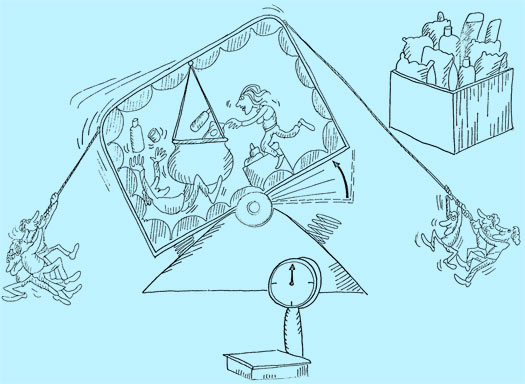 |
|
Image © TSI, 1976 |
| |
|
Running Scores and Positions:
1st Amalfi (I) (12pts awarded / Joker /
20pts total) ▲
2nd Wezembeek-Oppem (B) (3pts / 17pts) ▼
3rd Caslano Malcantone (CH) (5pts / 13pts)
▼
4th Birkenfeld (D) (4pts / 9pts) ▲
5th Newbury (GB) (--- / 8pts) ▼
6th Zutphen (NL) (3pts / 6pts)
7th Arbois (F) (3pts / 5pts) |
|
Comments:
This game was the most hilarious of those played on the night and the
teams really struggled to keep on heir feet. However, Italian team Amalfi
were confident enough to play their Joker on this game and got 12 points.
That’s what you call confidence!
In order that this game was authentic, the host broadcaster TSI purchased
a real caravan and cut one of the sides completely off (so that the
cameras could see in) and mounted the wheels on to a podium! |
Game 4 - Fishing with Push
The fourth game - 'Fishing with Push' - was played by six of the
seven teams (with the Italians taking time out) and involved one female and
two male competitors. Among the most popular sports we find fishing. Here it
is practiced with a particular technique... The 'fisher' (the female
competitor) sits on a special platform, made of a round inner-tube ring and a
formica top. Pushed by two male team mates, the fisher descends the slide,
reaches the bend and begins to turn. It is up to the competitor's ability and
of those who push her, to dive in such a way that she falls directly on the
most valued fish. If the competitor finishes her turn without diving, she
falls in the water without "fishing anything".
| |
|
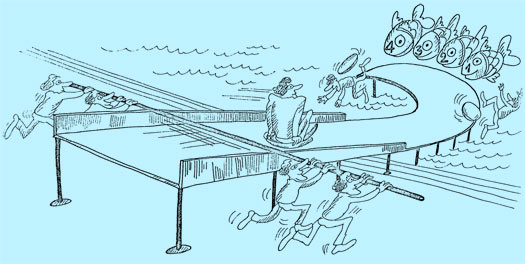 |
|
Image © TSI, 1976 |
| |
|
Running Scores and Positions:
=1st Newbury (GB) (12pts awarded / Joker /
20pts total) ▲
=1st Amalfi (I) (--- / 20pts)
3rd Caslano Malcantone (CH) (6pts / 19pts)
4th Wezembeek-Oppem (B) (1pt / 18pts) ▼
5th Birkenfeld (D) (4pts / 13pts) ▼
6th Zutphen (NL) (3pts / 9pts)
7th Arbois (F) (2pts / 7pts) |
Game 5 - Hitch-Hiking
The fifth game - 'Hitch-Hiking' - was played by six of the seven teams
(with the Dutch enjoying a break).
|
Running Scores and Positions:
1st Caslano Malcantone (CH) (12pts awarded
/ Joker / 31pts total) ▲
2nd Newbury (GB) (5pts / 25pts) ▼
=3rd Wezembeek-Oppem (B) (3pts / 21pts) ▲
=3rd Amalfi (I) (1pt / 21pts) ▼
5th Birkenfeld (D) (4pts / Joker / 17pts)
6th Arbois (F) (8pts / Joker / 15pts) ▲
7th Zutphen (NL) (--- / 9pts) ▼ |
|
Comments:
We are unable to present an illustrative
cartoon for this game as details of Game 5 are not included in the
surviving games information booklet that we have access to. |
Game 6 - Picnic on the Mountain
The sixth game - 'Picnic on the Mountain' - was played by six of the seven
teams (with the Belgians skipping the game) and involved three female and
three male competitors. Two couples of holiday-makers will picnic on the
mountainside meadow but an adversarial cow is giving them trouble... The cow
is held back by an elastic cord that permits it to reach the table cloth that
is laid out on the grass, at least for some seconds. The competitors must lay
the "table" with may things (cakes, sweets, plates, glasses, bottles, etc) and
when the cow arrives they must try to prevent it from throwing things from the
table-cloth. This can be done by drawing the table-cloth forwards and
backwards. The team that has kept the greater number of items on the
table-cloth at the end of the game will be declared the winners.
| |
|
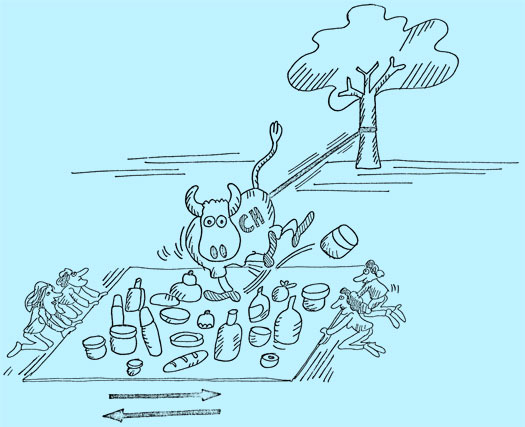 |
|
Image © TSI, 1976 |
| |
|
Running Scores and Positions:
1st Caslano Malcantone (CH) (1pt awarded /
32pts total)
2nd Newbury (GB) (5pts / 30pts)
3rd Amalfi (I) (2pts / 23pts)
4th Birkenfeld (D) (5pts / 22pts) ▲
=5th Wezembeek-Oppem (B) (--- / 21pts) ▼
=5th Zutphen (NL) (12pts / Joker / 21pts)
▲
7th Arbois (F) (3pts / 18pts) ▼ |
Game 7 - An Ice-Cream for the Miss
The seventh and penultimate game - 'An Ice-Cream for the Miss' - as played by six
of the seven teams (with the Swiss taking their turn to sit on the
sidelines).
|
Running Scores and Positions:
1st Newbury (GB) (5pts awarded / 35pts
total)
2nd Caslano Malcantone (CH) (--- / 32pts) ▼
=3rd Birkenfeld (D) (4pts / 26pts) ▲
=3rd Amalfi (I) (3pts / 26pts)
5th Arbois (F) (6pts / 24pts) ▲
6th Wezembeek-Oppem (B) (2pts / 23pts) ▼
7th Zutphen (NL) (1pt / 22pts) ▼ |
|
Comments:
We are unable to present an illustrative
cartoon for this game as details of Game 7 are not included in the
surviving games information booklet that we have access to. |
Fil Rouge - Holidays on the Island
The Fil Rouge in this event - 'Holidays on the Island' - was played individually over
seven heats, with each country fielding two male and one female competitors.
Some tourists have discovered a peaceful island and want to inhabit it. They
load their inflatable boats with their personal belongings, furniture and
fittings, and start rowing in the direction of the island. At the referee's
signal, opposition team members fire up water hydrants, intending to wash away
the possessions from the island. The team transporting and keeping the greater
number of possessions on the island will be declared the winner.
| |
|
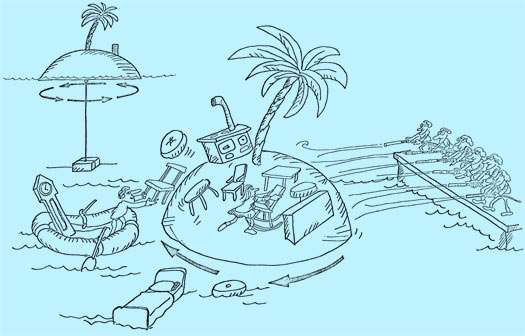 |
|
Image © TSI, 1976 |
| |
|
Final Fil Rouge Standings:
1st Wezembeek-Oppem (B)
=2nd Arbois (F)
=2nd Newbury (GB)
=4th Caslano Malcantone (CH)
=4th Amalfi (I)
6th Birkenfeld (D)
7th Zutphen (NL) |
|
Running Scores and Positions:
1st Newbury (GB) (6pts awarded / 41pts
total)
2nd Caslano Malcantone (CH) (4pts / 36pts)
=3rd Wezembeek-Oppem (B) (7pts / 30pts) ▲
=3rd Arbois (F) (6pts / 30pts) ▲
=3rd Amalfi (I) (4pts / 30pts)
6th Birkenfeld (D) (2pts / 28pts) ▼
7th Zutphen (NL) (1pt / 23pts) |
Game 8 - Universal Ski... It's A Knockout Version
The eighth and final game - 'Universal Ski... It's A Knockout Version' - was played in unison
by all seven teams. Each team fielded two competitors (one female, one male).
The game consists of floating skiers and the route is full of ascents and
descents. The route is divided up into "mountain", "lakes", route with rain,
etc. and at the beginning of every zone the competitor will find a particular
outfit and will have to put it on.
| |
|
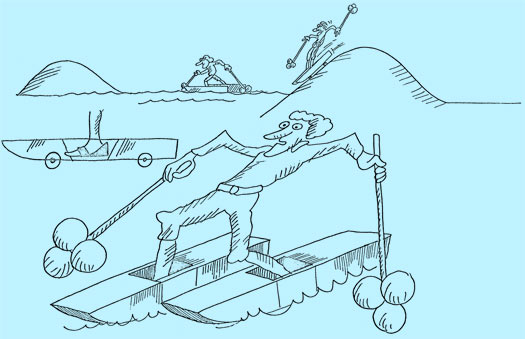 |
|
Image © TSI, 1976 |
| |
|
Final
Scores and Positions:
1st Newbury (GB) (5pts awarded / 46pts
total)
2nd Caslano Malcantone (CH) (7pts / 43pts)
3rd Arbois (F) (6pts / 36pts)
4th Amalfi (I) (3pts / 33pts) ▼
5th Birkenfeld (D) (4pts / 32pts) ▲
6th Wezembeek-Oppem (B) (1pt / 31pts) ▼
7th Zutphen (NL) (1pt / 24pts) |
|
|
Additional Information |
|
Swiss broadcasters staged this event the week after the
previous event, breaking from the usual fortnightly schedule. All the
broadcasters who would ordinarily show the programme live (those in
Switzerland and West Germany) elected to delay broadcast by one week to keep
to their established fortnightly transmission pattern.
The
competition proved to be a battle-royale between Newbury and Caslano Malcantone. The Swiss team won
four of the eight games they competed in, whilst Newbury only managed to win
one - their Joker game featuring 18-year old Susan Grantham, who really was the
heroine of the night. In addition to winning their Joker game, Newbury
registered five 2nd places, a 4th and a 3rd place in the final game. This was
Great Britain's first win in two years. The country's last victory was
recorded by Farnham in Avenches, Switzerland on 24th July 1974. |
|
Made
in Colour • This programme exists in the BBC Archives |
|
|
|
GB |
Jeux
Sans Frontières 1976 |
Heat
4 |
|
Event Staged: Wednesday 14th July 1976 from 9.00pm
Venue:
Roundhay Park, Leeds, West Yorkshire, Great Britain
European Transmissions (Local Timings):
BRT (B): Wednesday 14th July 1976, 9.05-10.30pm (Live)
SSR (CH): Wednesday 14th July 1976, 9.05-10.25pm (Live)
SRG (CH): Wednesday 14th July 1976, 9.05-10.30pm (Live)
TSI (CH): Wednesday 14th July 1976, 9.05-10.20pm (Live)
WDR 1 (D): Wednesday 14th July 1976, 9.05-10.30pm (Live)
RAI Due (I): Thursday 15th July 1976
Nederland 1 (NL): Friday 16th July 1976, 7.05-8.40pm
RTB (B): Sunday 18th July 1976, 8.25-9.45pm
RTP (P): Saturday 7th August 1976,
9.05-10.30pm
BBC1 (GB): Wednesday 1st September 1976,
7.15-8.30pm
Winners' Trophy presented by: Robin Scott CBE, Senior
Controller of BBC TV |
|
Theme:
Farm Animals |
|
Teams:
Tournai (B) v. Füllinsdorf (CH) v. Traunstein (D) v. Villefranche-sur-Saône
(F) v.
Kirklees (GB) v. Riva del Garda (I) v. Oldekerk (NL) |
|
Team Members included:
Tournai (B) - Katerine Arland, Michel Cordone, Guy Devaler,
Marie-France Mattante, Thierry Vissenaekens;
Füllinsdorf (CH) - Prudence Ravatti, Willi Shuchbach, Milly
Wistrich;
Traunstein (D) - Paula Beckenbauer, Gunther Brückstelle, Peter
Klein, Eve Langweier, Suzy Meyer, Kips Olden, Helmut Ortillinger, Peter
Purkop, Heribert Stern, Dagmar Sternhard, Stefan Walleslager, Maximillian
Wittebisler;
Villefranche-sur-Saône (F) - Joëlle Michant, Carole Montura,
Jean Moront, Patric Pembele, Clair Unziole;
Kirklees (GB) - Max Jones (Team Manager), Robert A. Blackshaw (Team
Captain and Team Coach), Janet Fidler (Women's Team Captain), Julie Athey,
Karen Athey, Eddie Berry, Kim Booth, Alan Conroy, Jonathan Crossland, Paul
Dallas, Gillian Gaskin, Brian Hayhurst, Barry Hodgson, Ian Jowett, Barry
Kenny, David Laverick, Tony Lees, Julie Mallalieu, Eileen Marchant, Dave
Millman, Graham Overend, Lesley Rowell, Lynette Thompson, Janet Williams;
Riva del Garda (I) - Marco Coratta, Patrizia Pollo;
Oldekerk (NL) - Henk Bos (Team Manager), Evert Bronda, Zitsey
Drenten, Ally de Fries, Cristi Kulver, Derek Ottema. |
|
Games
(Official Titles):
Tomatoes, Turkey Time, Churn It Up, In for a Duck, In A Sheepish Mood,
Donkey Work, Speedy and Sheepdogs;
Fil Rouge: Flower Power;
Reserve Game: Bale Away (not used);
Jokers: Farmers with Pitchforks. |
|
Game Results and Standings |
|
Games |
|
Team /
Colour |
1 |
2 |
3 |
4 |
5 |
6 |
7 |
FR |
8 |
Points Scored
(Joker games shown in red) |
|
B |
6 |
3 |
--- |
1 |
3 |
1 |
4 |
4 |
2 |
|
CH |
4 |
5 |
1 |
--- |
4 |
3 |
5 |
3 |
7 |
|
D |
2 |
4 |
6 |
3 |
--- |
4 |
12 |
7 |
3 |
|
F |
6 |
2 |
3 |
2 |
6 |
--- |
2 |
3 |
1 |
|
GB |
1 |
6 |
4 |
12 |
5 |
6 |
--- |
6 |
5 |
|
I |
--- |
1 |
2 |
4 |
2 |
5 |
2 |
1 |
6 |
|
NL |
5 |
--- |
5 |
5 |
8 |
2 |
3 |
6 |
4 |
Running Totals
(Leading teams shown in red) |
|
B |
6 |
9 |
9 |
10 |
13 |
14 |
18 |
22 |
24 |
|
CH |
4 |
9 |
10 |
10 |
14 |
17 |
22 |
25 |
32 |
|
D |
2 |
6 |
12 |
15 |
15 |
19 |
31 |
38 |
41 |
|
F |
6 |
8 |
11 |
13 |
19 |
19 |
21 |
24 |
25 |
|
GB |
1 |
7 |
11 |
23 |
28 |
34 |
34 |
40 |
45 |
|
I |
0 |
1 |
3 |
7 |
9 |
14 |
16 |
17 |
23 |
|
NL |
5 |
5 |
10 |
15 |
23 |
25 |
28 |
34 |
38 |
|
|
|
Result |
Team |
Points |
Final Scoreboard |
|
1st
2nd
3rd
4th
5th
6th
7th |
GB
• Kirklees
●
D • Traunstein
NL • Oldekerk
CH • Füllinsdorf
F • Villefranche-sur-Saône
B • Tournai
I • Riva del Garda |
45
41
38
32
25
24
23 |
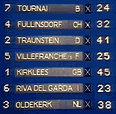 |
|
The Host
Town |
|
Leeds, West Yorkshire
Leeds is a city with a population of around 550,000 inhabitants in the
county of West Yorkshire. It is located on the River Aire, 24 miles (38km)
south of Ripon, 47 miles (76km) east of Preston, 50 miles (80km) east of
Kingston-upon-Hull and 61 miles (98km) north of Derby.
The Borough of Leeds was created in 1207 when the owner of the manor, Maurice
Paynel (c. 1184-1230, sometimes described as Maurice de Gant) found himself in
debt. With the manor already mortgaged, he needed to increase his income. A
way of doing this was to establish Leeds as a borough where some of the
inhabitants would be freed from their obligations to work in the fields, and
left to follow a craft or trade. In return they would pay a high rent to the
Lord of the Manor. Paynel hoped that this would attract skilled craftsmen from
elsewhere to settle in his borough.
A new town was established, along a broad street stretching from the edge of
the open fields in the north down to the crossing point on the River Aire. On
either side of the street there were 30 building plots (burgage plots) where
craftsmen could live and pursue their trade. The owners of the plots of land
were called burgesses, and they were also given a half acre plot of land at
Burmantofts (burgage mens’ tofts). Their income came from a craft or trade,
not from agriculture, and they paid a rent of 16d (1s 4d) a year to Maurice
Paynel.
In 1612, King James I (1566-1625) granted the borough to his wife, Anne of
Denmark (1574-1619). The inhabitants petitioned Charles I (1600-1649) for a
charter of incorporation, which was granted in 1626. The new charter
incorporated the entire parish, including all eleven townships, as the Borough
of Leeds and withdrew the earlier charter. Improvement commissioners were set
up in 1755 for paving, lighting, and cleansing of the main streets, including
Briggate and further powers were added in 1790 to improve the water supply.
Before the Industrial Revolution (1760-1840), it became a co-ordination centre
for the manufacture of woollen cloth, and white broadcloth was traded at its
White Cloth Hall. Leeds handled one sixth of England's export trade in 1770
and growth, initially in textiles, was accelerated by the creation of the Aire
and Calder Navigation in 1699 and the Leeds and Liverpool Canal in 1816.
In the late Georgian era, William Lupton (1777-1828) was one of a number of
central Leeds landowners, some of whom, like him, were also textile
manufacturers. At the time of his death, Lupton occupied the enclosed fields
of the manor of Leeds, his estate including a mill, reservoir, substantial
house and outbuildings. Marshall's Mill was one of the first of many factories
constructed in Leeds from around 1790 when the most significant were woollen
finishing and flax mills.
The railway network constructed around Leeds, starting with the Leeds and
Selby Railway in 1834, provided improved communications with national markets
and, significantly for its development, an east-west connection with
Manchester and the ports of Liverpool and Kingston-upon-Hull giving improved
access to international markets. Alongside technological advances and
industrial expansion, Leeds retained an interest in trading in agricultural
commodities, with the Corn Exchange opening in 1864.
The borough corporation was reformed under the provisions of Municipal
Corporations Act 1835. The borough became a county borough in 1889, giving it
independence from the newly formed West Riding County Council and it gained
city status in 1893.
Manufacturing diversified by 1914 to printing, engineering, chemicals and
clothing manufacture. Decline in manufacturing during the 1930s was
temporarily reversed by a switch to producing military uniforms and munitions
during the Second World War (1939-1945). However, by the 1970s, the clothing
industry was in irreversible decline, facing cheap foreign competition.
Today, the economy of Leeds is considered the most diverse economy of all the
United Kingdom's main employment centres and one which has seen the fastest
rate of private-sector jobs growth of any UK city. Leeds is the largest legal
and financial centre in England outside of London, and third largest in the UK
after Edinburgh. In 2011, its financial and insurance services industry was
worth £2.1 billion, with more than 30 national and international banks located
in the city. It is also the UK's third largest manufacturing centre with
around 1,800 firms and 39,000 employees, Leeds manufacturing firms account for
8.8% of total employment in the city. The largest sub-sectors are engineering,
printing and publishing, food and drink, chemicals and medical technology. |
|
The Venue |
|
Roundhay Park
The
games were played in Rounday Park, one of the biggest city parks in Europe. It
has more than 700 acres (2.8 km²) of parkland, lakes, woodland and gardens and
is owned by Leeds City Council. The park is one of the most popular
attractions in Leeds, visited by close to a million people each year. It is
situated on the north-east edge of the city, bordered by the suburb of
Roundhay to the west, Oakwood to the south and the A6120 outer ring road to
the north.
There is no mention of Roundhay in the Domesday Book, but it is
understood that the land was granted to Ilbert De Lacy by William the
Conqueror for his loyalty to the monarch and for his support in the
subjugation campaigns of the winter 1069–70 in the North of England. In the
reign of King Henry II, a charter had been granted by Robert de Lacy, Baron of
Pontefract, giving rights to timber and pasturage at 'Rundehaia' to the monks
at Kirkstall Abbey, where he was buried after his death in 1193. It is stated
that King John visited Roundhay in 1212 and spent three days in hunting.
Ownership of Roundhay passed through succession to John of Gaunt and then to
his son, Henry IV. In the 16th century, Henry VIII gave the park (though not
the manor) to Thomas Darcy. Through succession and marriage, it was acquired
by Charles Stourton, XV Baron Stourton (1702–1753) in the 18th century.
In more recent years, the estate, part of the ancient Manor of
Roundhay, was bought in 1804 by Thomas Nicholson of Chapel Allerton, a London
banker, and was laid out as a park. When Nicholson died in 1821, the estate
passed to his half-brother Stephen. In 1858, William Nicholson inherited the
land on the death of his uncle. He was destined to be the last private owner
of the park as, when William Nicholson died in 1868, the estate fell into
Chancery and was put up for sale in 1871.
Roundhay Park was purchased for £139,000 by a group including
the Mayor of Leeds, Sir John Barran (1821-1905), with a view to selling it on
to the local council. Leeds City Council was unable to buy such a large tract
of land without an Act of Parliament, which was obtained on 21st June 1871.
The local authority agreed to pay the same price and gave the estate to the
people of Leeds as a public park.
Leeds architect, George Corson, won the competition for
landscaping Roundhay Park. Some parts of the estate were then sold for
building plots to offset the cost to the council and Barran. HRH Prince
Arthur, the Duke of Connaught, officially re-opened the park in 1872, a
ceremony attended by 100,000 people who were not dissuaded by the poor public
transport links between the centre of Leeds and the park. In 1891, this
shortcoming was addressed when a public electric tram with overhead power
(trolley system) was inaugurated, linking Roundhay Park with Leeds city centre
3 miles (4.8 km) away. It was the first transport system of its type in
Britain. The tram terminus is now a car park but some of the trolley poles
remain.
In the eastern part of the park is Waterloo Lake. At its south
end is a dam, and in 1907 an open-air swimming pool was constructed below it.
It was known as a lido and was particularly popular during the 1950s but was
closed and filled in during the 1980s. The area is now a car park, still
signposted 'Lido'.
The park has staged many events. In 1896, Charles Blondin
(1824-1897), the famed French tightrope walker and acrobat, then 72, crossed
several times on a wire suspended over the upper lake. Since then there have
been music concerts, festivals, firework displays, balloon ascents, parachute
jumps and many other events, including some of a sporting nature. For
instance, an enthusiastic crowd of 80,000 watched a rugby league sevens match
between England and Australia in the park in 1933, won 29–11 by Australia.
Recent times have witnessed tragedy. In June 2005, two
teenagers drowned in Waterloo Lake: a memorial stone on the lakeside footpath
recalls their memory. Later, in January 2007, the Lakeside Café was
extensively damaged by fire. Following complete renovation, including a new
roof, it has reopened. |
|
The Games
in Detail |
|
Game 1 - Tomatoes
The first game - 'Tomatoes' - was played in unison by six of
the seven teams (with the Italians sitting it out). Each team fielded four
competitors (2 male, 2 female). One man was required to drive an electric
tractor, towing a trailer. Two girls each had to collect two tomatoes and
stand on the trailer. They were assisted in this by another man. The girls
were then pulled down the course by the tractor, the driver carefully avoiding
various hazards. If someone dropped their tomato, the man who was tasked with
assisting the girls was allowed to run down the course to collect it and
return it to his team. The first team to complete the course with all their
tomatoes was to be declared the winner.
| |
|
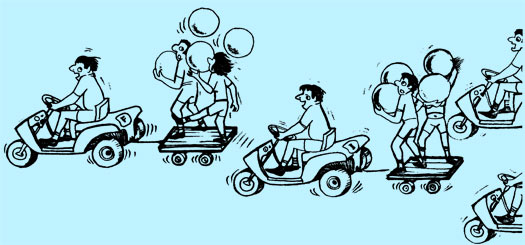 |
|
Image © BBC, 1976 |
| |
|
Running Scores and Positions:
=1st Tournai (B) (6pts awarded
/ Joker / 6pts total)
=1st Villefranche-sur-Saône (F) (6pts / 6pts)
3rd Oldekerk (NL) (5pts / 5pts)
4th Füllinsdorf (CH) (4pts / 4pts)
5th Traunstein (D) (2pts / 2pts)
6th Kirklees (GB) (1pt / 1pt)
7th Riva del Garda (I) (--- / 0pts) |
Game 2 - Turkey Time
The second game - 'Turkey Time' - was played by six of the seven teams (with
the Dutch taking a breather) over the course of three heats which featured two
teams each. Each team fielded two male competitors (one to throw, one to push)
and one female competitor (to catch). Two men, one per country per heat,
positioned on a disc or outside a circled area, had to throw balls (eggs) in
their country's colour into an opening on top of a giant turkey. The egg would
then drop through and be shot out in an uncontrollable direction as the turkey
is rotated by two men from opposing neutral teams. Two girls, one per country
per heat, had to try to catch their country's eggs individually in a basket
and deposit them into a container outside the circled area. The team which had
caught the greater number of their country's eggs within the time limit would
be declared the winner.
| |
|
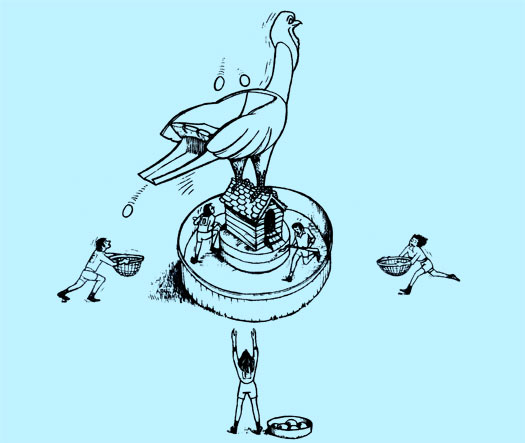 |
|
Image © BBC, 1976 |
| |
|
Running Scores and Positions:
=1st Tournai (B) (3pts awarded
/ 9pts total)
=1st Füllinsdorf (CH) (5pts / 9pts) ▲
3rd Villefranche-sur-Saône (F) (2pts / 8pts)
▼
4th Kirklees (GB) (6pts / 7pts) ▲
5th Traunstein (D) (4pts / 6pts)
6th Oldekerk (NL) (--- / 5pts) ▼
7th Riva del Garda (I) (1pt / 1pt) |
Game 3 - Churn It Up
The third game - 'Churn It Up' - was played by six of the seven teams (with
the Belgians missing out) over the course of two heats which featured three
teams each. Each team fielded one female and two male competitors on this
game. One girl had to sit on a stool, milking a cow via a simple tap into four
buckets which are filled and then carried by two male farmhands wearing yokes.
After walking down the slippery farmyard, the two farmhands, still carrying
the milk, had to climb over a stile, up a seesaw and empty the milk from their
buckets into the churn marked with their country's letters. They then had to
return over the same route to exchange their empty buckets for full ones,
enabling them to repeat the course. The team with the most milk emptied into
their country's churn with the time limit would win the game.
| |
|
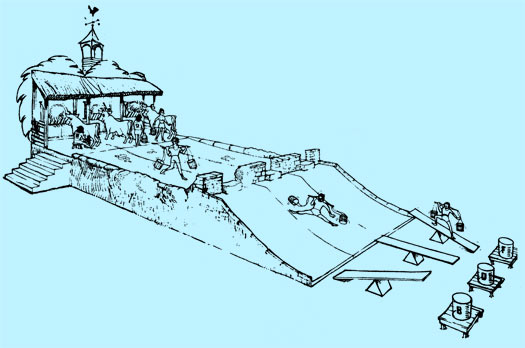 |
|
Image © BBC, 1976 |
| |
|
Running Scores and Positions:
1st Traunstein (D) (6pts awarded / 12pts
total) ▲
=2nd Villefranche-sur-Saône (F) (3pts / 11pts)
▲
=2nd Kirklees (GB) (4pts / 11pts) ▲
=4th Füllinsdorf (CH) (1pt / 10pts) ▼
=4th Oldekerk (NL) (5pts / 10pts) ▲
6th Tournai (B) (---
/ 9pts) ▼
7th Riva del Garda (I) (2pts / 3pts) |
Game 4 - In for a Duck
The fourth game - 'In for a Duck' - was played by six of the
seven teams (with the Swiss taking time out) over the course of two heats
which featured three teams each. Each team fielded one male and two female
competitors on this game. One girl had to find balls in her country's colour
hidden in the straw and then pass them to a man in a duck costume, to carry in
his arms. He had to race across a little bridge en route to the finish area
where another girl was required to take the eggs from him and unload them. The
man returns to collect further eggs. The team which collects the most eggs
within the allowed time would win the game.
| |
|
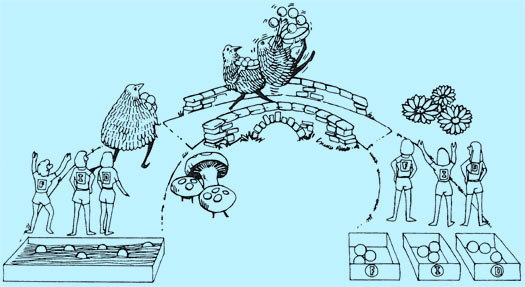 |
|
Image © BBC, 1976 |
| |
|
Running Scores and Positions:
1st Kirklees (GB) (12pts awarded / Joker /
23pts total) ▲
=2nd Traunstein (D) (3pts / 15pts) ▼
=2nd Oldekerk (NL) (5pts / 15pts) ▲
4th Villefranche-sur-Saône (F) (2pts / 13pts)
▼
=5th Füllinsdorf (CH) (--- / 10pts) ▼
=5th Tournai (B) (1pt
/ 10pts) ▲
7th Riva del Garda (I) (4pts / 7pts) |
Game 5 - In a Sheepish Mood
The fifth game - 'In a Sheepish Mood' - was played by six of the seven teams
(with the Germans enjoying a break) over the course of two heats which
featured three teams each. Each team fielded one male competitor on this game.
One man from each team had to pick up a sheep from the pen and take it through
a hole in the hedge, up the ramp to the pool. They had to pull in the
suspended rope with their crook, swing over and down the ramp on the opposite
side. They then had to negotiate obstacles on the path and climb the ramp to
deposit the sheep on top of the mountain. This done, the competitors had to
return to collect further sheep. The team with the most sheep collected within
the time limit would be declared the winner.
| |
|
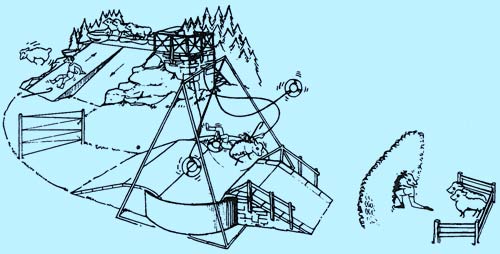 |
|
Image © BBC, 1976 |
| |
|
Running Scores and Positions:
1st Kirklees (GB) (5pts awarded / 28pts
total)
2nd Oldekerk (NL) (8pts / Joker / 23pts) ▲
3rd Villefranche-sur-Saône (F) (6pts / 19pts)
▲
4th Traunstein (D) (--- / 15pts) ▼
5th Füllinsdorf (CH) (4pts / Joker / 14pts)
6th Tournai (B) (3pts
/ 13pts) ▼
7th Riva del Garda (I) (2pts / Joker /
9pts) |
Game 6 - Donkey Work
The sixth game - 'Donkey Work' - was played by six of the seven teams (with
the French not taking part) over the course of two heats which featured three
teams each. Each team fielded two male competitors and one female competitor
(with the added possibility of Women's Captains filling buckets on top of the
ramp) on this game. A female competitor had to empty three buckets of water into pannier
tanks strapped over the back of a donkey on wheels. A line attached to the
front of the donkey ran up the ramp through a pulley, finishing fixed to a
cross bar held by two male farmhands. Three fresh buckets of water were
hanging from this bar which the girl at the base of the ramp needed to fill
the donkey's pannoier tanks once she had emptied her first three buckets. So,
the two men had to walk down the ramp pulling the donkey up, deliver their
buckets of fresh water to the girl, then walk up the ramp, letting the donkey
down for refilling - with the weight of the water in the pannier gradually
increasing. The team with most water in their donkey's pannier tanks within
the time limit would win the game.
| |
|
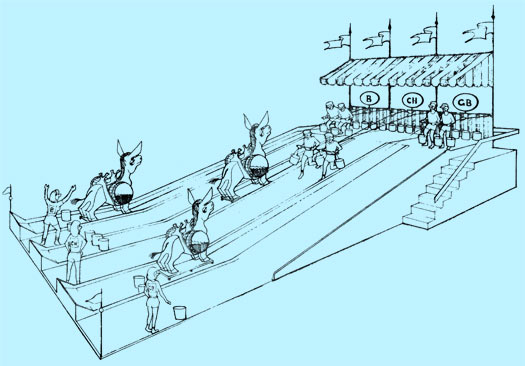 |
|
Image © BBC, 1976 |
| |
|
Running Scores and Positions:
1st Kirklees (GB) (6pts awarded / 34pts
total)
2nd Oldekerk (NL) (2pts / 25pts)
=3rd Traunstein (D) (4pts / 19pts) ▲
=3rd Villefranche-sur-Saône (F) (--- / 19pts)
5th Füllinsdorf (CH) (3pts / 17pts)
=6th Tournai (B) (1pt
/ 14pts)
=6th Riva del Garda (I) (5pts / 14pts) ▲ |
Game 7 - Speedy
The seventh and penultimate game - 'Speedy' - as played by six
of the seven teams (with the British taking their turn to sit on the
sidelines) over the course of six heats which featured one team each. Each
team fielded three male and three female competitors on this game. Three men
and three girls were inside a caterpillar costume but only the man at the back
could see. He had to shout information to his team inside the costume,
directing them over a course of items to be correctly negotiated, such as
croquet hoops, flowers, toadstools, ladybirds and the like, finally finishing
by climbing into a cocoon. The team completing the course correctly in the
quickest time would win the game.
| |
|
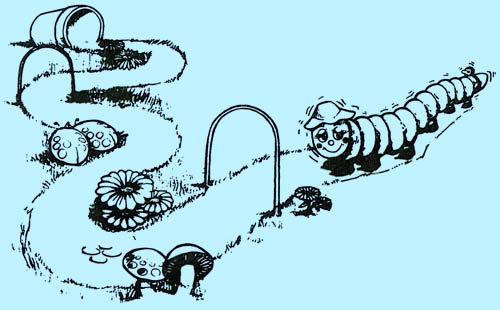 |
|
Image © BBC, 1976 |
| |
|
Running Scores and Positions:
1st Kirklees (GB) (--- / 34pts total)
2nd Traunstein (D) (12pts awarded / Joker /
31pts) ▲
3rd Oldekerk (NL) (3pts / 28pts) ▼
4th Füllinsdorf (CH) (5pts / 22pts) ▲
5th Villefranche-sur-Saône (F) (2pts /
Joker / 21pts) ▼
6th Tournai (B) (4pts
/ 18pts)
7th Riva del Garda (I) (2pts / 16pts) ▼ |
Fil Rouge - Flower Power
The Fil Rouge in this event - 'Flower Power' - was played individually over
seven heats, with each country fielding one female and two male competitors.
There would also be six men playing in opposition - one from each country - in
each heat. Two men in a pantomime horse costume had to progress along a
course, with a girl on the back of the horse (she sat on the shoulders of the
man in the back of the costume). The girl had to collect flowers en route,
dismounting to pick them. Having done so, she had to remount the horse before
proceeding to the next bunch of flowers, carrying all flowers collected at all
times. The opposing team, comprising of one man from each country, had to
place or build various obstacles along the course to impede the speed of
progress of horse and rider. The team picking the most flowers in the allowed
time would be declared the winner.
| |
|
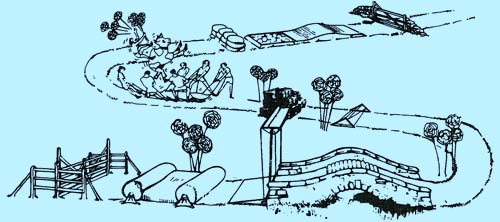 |
|
Image © BBC, 1976 |
| |
|
Final Fil Rouge Standings:
1st Traunstein (D)
=2nd Kirklees (GB)
=2nd Oldekerk (NL)
4th Tournai (B)
=5th Füllinsdorf (CH)
=5th Villefranche-sur-Saône (F)
7th Riva del Garda (I) |
|
Running Scores and Positions:
1st Kirklees (GB) (6pts awarded / 40pts
total)
2nd Traunstein (D) (7pts / 38pts)
3rd Oldekerk (NL) (6pts / 34pts)
4th Füllinsdorf (CH) (3pts / 25pts)
5th Villefranche-sur-Saône (F) (3pts / 24pts)
6th Tournai (B) (4pts
/ 22pts)
7th Riva del Garda (I) (1pt / 17pts) |
Game 8 - Sheepdogs
The eighth and final game - 'Sheepdogs' - was played in unison
by all seven teams. Each team fielded two competitors (one female, one male)
on this game. At the whistle, one man - in sheepdog costume - from each
country had to run out on all fours from a pen to pick up sheep from a number
covering all teams in a collective group. The sheepdogs could only pick up
their sheep with their teeth, gripping a small flap on the sheep's back
covering their country's identification. When all his sheep had been collected
and placed in the pen, a girl from his team had to raise their country's flag
to signify finishing the game. The first team with all, or the greater number
of its sheep collected within the time limit would win the game.
| |
|
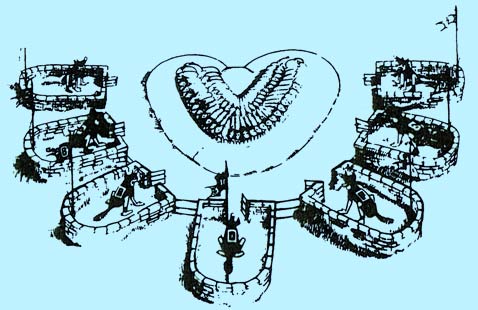 |
|
Image © BBC, 1976 |
| |
|
Final
Scores and Positions:
1st Kirklees (GB) (5pts awarded / 45pts
total)
2nd Traunstein (D) (3pts / 41pts)
3rd Oldekerk (NL) (4pts / 38pts)
4th Füllinsdorf (CH) (7pts / 32pts)
5th Villefranche-sur-Saône (F) (1pt / 25pts)
6th Tournai (B) (2pts
/ 24pts)
7th Riva del Garda (I) (6pts / 23pts)
|
Reserve Game - Bale Away
It was not necessarily to use the reserve game - 'Bale Away' -
on the night. It was flexible in that it could be played in one heat by six or
seven competitors (one man from each country), depending on what game it was
called to replace. If the game had been played, it would have proceeded as
follows: at the whistle, one man would have to run to stand on a straw bale.
He would have been carrying a second bale, which he was to place on the ground
in front of him, so that he could step on to it. The idea was that he would
then pick up the first bale from the ground behind him and place that in front
of him to step on to, and so on, until the full length of the course had been
covered. The team which was first to cross the finish line, complete with both
bales, would have been declared the winner of this reserve game.
| |
|
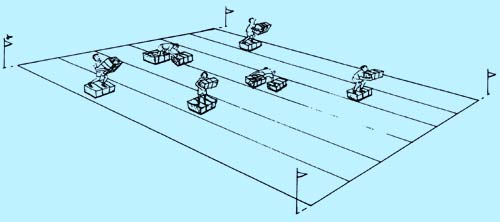 |
|
Image © BBC, 1976 |
| |
|
|
Memories of Jeux Sans Frontières |
|
Following interviews with British team members in 2010 with the
Huddersfield Daily Examiner, it emerged that the Italian team had won the
rehearsal. Kirklees team member Eddie Berry recalled: "One incident I remember during the European round was when I
was going into lunch after the rehearsal. The Italian team had won the
rehearsal and were showing off making a human pyramid. I was walking past with
Brian Hayhurst who suddenly, in mid-stride, did a somersault with twist and
carried on walking. The Italians, on seeing this, collapsed into a heap. They
went on to come last in the real competition."
Dave Millman recalled how one of the games had him dressed in
tights, flippers and a huge duck costume. “The competitors had to dive into
this huge pile of straw and pull out a rugby ball. I got to the final against
the German and, as we were running towards the straw, he hit me in the side.
When I got to within four metres of the straw I dived in and the next thing I
knew this guy landed on top of me. We couldn’t even see the ball, but
eventually I found it. It was a fantastic experience”. However, it seems that
Dave’s memories were slightly faded after 34 years, as in fact they were
actually footballs and it was the Dutch team member that contested the final
round with him. It would seem that Dave’s memory of the game had suddenly
returned during the reunion programme on BBC’s Inside Out, because he
clearly states that it was him and the Dutch player that competed for last
egg. This was more likely to be that he was shown the game during the
recording of that programme and the commentary by Stuart Hall clearly jogged
his memory!
David Laverick, 51, was the baby of the team. He was a 16-year old schoolboy
at Newsome High School and a Longwood Harrier runner when he won his place in
the team. He recalled that at Roundhay Park, he was the back end of a
pantomime horse. "I can’t remember who was at the front end, but the pair of
us had to run round and climb a ladder at the end. I think we finished second.
It was good entertainment and it was a really popular programme back then”.
Jonathan Crosland, 57, was a Physical Education teacher at Earlsheaton High
School in Dewsbury back in 1976. He remembers the continental teams bringing
gifts with them. “I still have the snuff kit which the West Germans brought us
and the Dutch team gave us tankards. The French team brought cases and cases
of Beaujolais with them, but they weren't allowed to take them all through
Customs, so we only got one bottle each. I can’t remember what we gave them”. |
|
Presenters, Officials and Production Team |
|
The winning team’s trophy was presented to them by BBC
executive Robin Scott. Robin had been the producer of the very first It’s A
Knockout held in Great Britain in 1966, and it was he that had given the
show its British title. |
|
Additional Information |
|
The game titles given above are official titles, with the
exception of 'Finding the Eggs' (official title - 'In for a Duck') and 'Ride A
Pantomime Horse' (original title - 'Flower Power'). We have elected to use our
own titles for these games as they were changed significantly between original
planning and the games as played on the night. The Fil Rouge was originally to
have featured the girl on the pantomime horse dismounting to pick up flowers,
then remounting. This idea was dropped. Likewise, 'Finding the Eggs' was
originally to have featured male team members dressed in duck costumes, who
would carry the eggs found amongst the hay, and this feature was also
discarded. Game 7 - 'Speedy' - was also changed to feature two teams in three
heats, rather than it being run in six individual heats.
The teams were asked to give names to the pantomime horses for
the Fil Rouge, which presenter Eddie Waring referred as the Leeds Grand
National. Although the Italian and British teams’ horses names were not
revealed, the other five countries’ names ranged from Old Hoppa-Poppa
(Netherlands), Lightning (B), Olly (CH), Beauty (D) and Trigger (F).
Finishing in last place on the very first game ultimately lost
Kirklees the opportunity to represent Great Britain in the International Final
in Blackpool later on in the year. Finishing in the top two positions on all
the other games (except for two when the team finished in third place), they
would have easily have beaten Newbury’s positioning on games should they have
equalled their points score. Having had scored 40pts before the final game,
the team needed to finish in second place on the game to qualify for the
International Final. If they had succeeded, the team would have qualified with
more first placings (3:1) than Newbury from the previous heat, but
unfortunately could only manage to finish in third place.
As was the norm with the BBC version of the programme,
information was shielded from the home crowd as to previous performances of
British teams that year. No mention of Newbury’s victory was revealed by
either presenter, although referee Gennaro Olivieri mentioned to Stuart Hall
after allocating the final game’s score, “Just one point from the Final”.
Stuart Hall acknowledged his words but elaborated no further, and unless you
listened very carefully that statement by Gennaro would have gone unnoticed by
most people on-site. However, in the West German broadcast, Manfred
Erdenberger could not wait to explain that Newbury had resisted the Kirklees
challenge by just one point and that Traunstein were the current qualifiers
for West Germany by scoring one point more than the previous incumbents,
Trostberg who had scored 40pts!
Kirklees team member Brian Hayhurst was celebrating more than
just the win on the night of the Roundhay Park recording - it was also his
35th birthday!
Although the Kirklees team won this heat, they missed out on
representing Great Britain in the International Final in Blackpool. Jonathan
explained that “Newbury won their International Heat by one more point than
us, so they got to represent Britain in the Final”. |
|
Made
in Colour • This programme exists in the BBC Archives |
|
|
|
B |
Jeux
Sans Frontières 1976 |
Heat
5 |
|
Event Staged: Wednesday 11th August 1976
Venue:
La Plaine de Cointe (Play Area of Cointe), Cointe, Liège, Belgium
European Transmissions (Local Timings):
BRT (B): Wednesday 11th August 1976, 9.05-10.20pm (Live)
SSR (CH): Wednesday 11th August 1976, 9.05-10.25pm (Live)
SRG (CH): Wednesday 11th August 1976, 9.05-10.25pm (Live)
TSI (CH): Wednesday 11th August 1976, 9.05-10.20pm (Live)
WDR 1 (D): Wednesday 11th August 1976, 9.05-10.30pm (Live)
RAI Due (I): Thursday 12th August 1976
Nederland 1 (NL): Friday 13th August 1976, 7.05-8.40pm
RTB (B): Sunday 15th August 1976, 8.35-9.45pm
RTP (P): Saturday 21st August 1976,
9.05-10.40pm
BBC1 (GB exc. Wales): Friday 10th September 1976,
7.10-8.30pm
BBC1 Wales (CYM): Sunday 12th September 1976, 2.00-3.20pm
Winners' Trophy presented by: Michel Lemaire |
|
Theme:
Cycling and Tour de France |
|
Teams:
Liège (B) v. La Neuveville (CH)
v. Bad Füssing (D) v. Agen (F) v.
Thurrock (GB) v. Perugia (I) v. Hilvarenbeek (NL) |
|
Team Members included:
Liège (B) - Simeon Rutter, Marilyn Woolf;
La Neuveville (CH) - Sylvia Constantes, Denise Mattie, Marcel
Weber;
Bad Füssing (D) - Suzy Graham, Albert Vimmer;
Agen (F) - Phillipe Lacompais;
Thurrock (GB) - Malcolm Gow (Team Manager), Terry Lax (Team
Captain), Jack Benton (Team Coach), Julie Bannister, Michael Brightwell, Costa Buller,
Trevor Burge, Malcolm Burton, Geoffrey Cave, John Chapman, Colin Elsden,
Andrea Eustace, Geraldine Gray, David Groom, Tony Hills, Alan Jousiffe, Susan
Jousiffe, Susan Kane, Gloria Kemp, Michael ‘Doc’ Leckenby, Valerie McCormack,
Kay Meiklejohn, Erica Morris, Ray ‘The Star’ Page, Jack Palmer, Colin Paxman,
Ray Smallcombe, William Smith, Gary Telfer, Bob Williams;
Perugia (I) - Danni Artentano, Emilie Beccolotti, Vincenzo Ciotti,
Antonella Duchini;
Hilvarenbeek (NL) - Arve Harper, Ine Hoorsman, Nancy Pikker. |
|
Games
(Official Titles): Le Grand Prix de la Montagne (The Mountain Grand Prix),
Les Roues de Recharge (Hoopla!), Les Domestiques (Giants), Course au Ralenti
sur Velos Drôles (Slow Motion Bikes),
La Panne Séche (Push Off),
Le Velo-Foot (Bike Football), Le Match Poursuite (The Pursuit Match) and
L'Interview (Amazed!);
Fil Rouge: Le Jour de Repos (The Day Off);
Jokers: Bicycle Wheels. |
|
Game Results and Standings |
|
Games |
|
Team /
Colour |
1 |
2 |
3 |
4 |
5 |
6 |
7 |
FR |
8 |
Points Scored
(Joker games shown in red) |
|
B |
6 |
4 |
1 |
6 |
3 |
3 |
--- |
7 |
6 |
|
CH |
--- |
6 |
6 |
4 |
5 |
12 |
6 |
4 |
2 |
|
D |
2 |
--- |
2 |
6 |
8 |
5 |
6 |
3 |
1 |
|
F |
3 |
5 |
--- |
2 |
2 |
8 |
6 |
2 |
3 |
|
GB |
5 |
3 |
3 |
--- |
2 |
2 |
2 |
6 |
7 |
|
I |
4 |
2 |
6 |
1 |
--- |
2 |
2 |
1 |
4 |
|
NL |
1 |
1 |
6 |
10 |
6 |
--- |
6 |
5 |
5 |
Running Totals
(Leading teams shown in red) |
|
B |
6 |
10 |
11 |
17 |
20 |
23 |
23 |
30 |
36 |
|
CH |
0 |
6 |
12 |
16 |
21 |
33 |
39 |
43 |
45 |
|
D |
2 |
2 |
4 |
10 |
18 |
23 |
29 |
32 |
33 |
|
F |
3 |
8 |
8 |
10 |
12 |
20 |
26 |
28 |
31 |
|
GB |
5 |
8 |
11 |
11 |
13 |
15 |
17 |
23 |
30 |
|
I |
4 |
6 |
12 |
13 |
13 |
15 |
17 |
18 |
22 |
|
NL |
1 |
2 |
8 |
18 |
24 |
24 |
30 |
35 |
40 |
|
|
|
Result |
Team |
Points |
Final Scoreboard |
|
1st
2nd
3rd
4th
5th
6th
7th |
CH
• La Neuveville
● ●
NL • Hilvarenbeek ●
B • Liège
D • Bad Füssing
F • Agen
GB • Thurrock
I • Perugia |
45
40
36
33
31
30
22 |
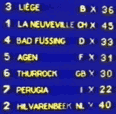 |
|
The Venue |
|
Liège, Belgium
This heat was held in Cointe, a western suburb of the city of
Liège. The
games arena was located in a multi-functional leisure complex known as Le
Plaine - loosely translated as The Play Area. The facilities in the complex
include basketball, tennis and volleyball courts, a rifle range and a
full-size football pitch surrounded by an athletics track. Each of the sports
has its own particular area and is cordoned off from each other by small hand
barriers. However, when the programme was held there, many of these barriers
had to be removed and special flooring was laid over the courts’ bases to
protect the surfaces. |
|
The Games
in Detail |
|
Game 1 - Le Grand Prix de la Montagne (The Mountain Grand Prix)
| |
|
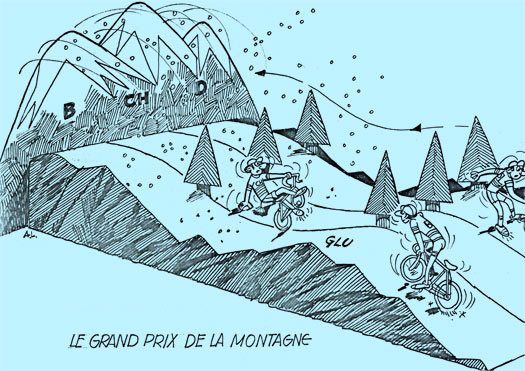 |
|
Image © RTBF, 1976 |
| |
|
Running Scores and Positions:
1st Liège (B) (6pts awarded
/ 6pts total)
2nd Thurrock (GB) (5pts / 5pts)
3rd Perugia (I) (4pts / 4pts)
4th Agen (F) (3pts / 3pts)
5th Bad Füssing (D) (2pts / 2pts)
6th Hilvarenbeek (NL) (1pt / 1pt)
7th La Neueville (CH) (--- / 0pts) |
Game 2 - Les Roues de Recharge (Hoopla!)
| |
|
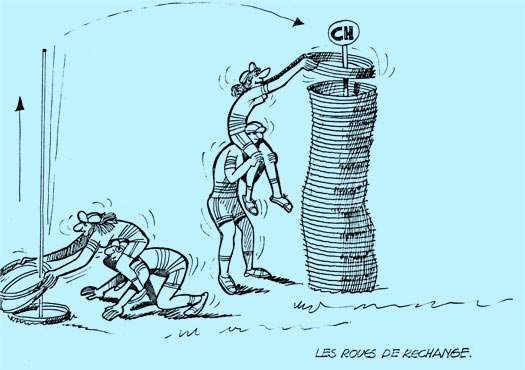 |
|
Image © RTBF, 1976 |
| |
|
Running Scores and Positions:
1st Liège (B) (4pts awarded / 10pts total)
=2nd Agen (F) (5pts / 8pts) ▲
=2nd Thurrock (GB) (3pts / 8pts)
=4th La Neueville (CH) (6pts / 6pts) ▲
=4th Perugia (I) (2pts / 6pts) ▼
=6th Bad Füssing (D) (--- / 2pts) ▼
=6th Hilvarenbeek (NL) (1pt / 2pts) |
Game 3 - Les Domestiques (Giants)
| |
|
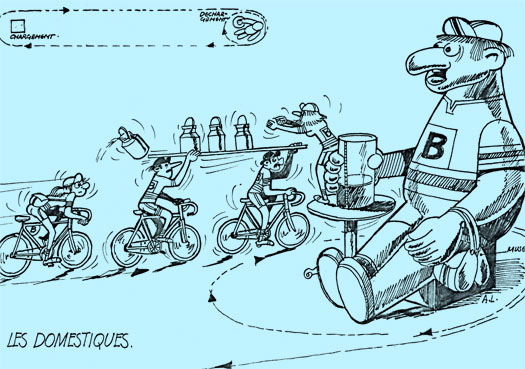 |
|
Image © RTBF, 1976 |
| |
|
Running Scores and Positions:
=1st La Neueville (CH) (6pts awarded / 12pts
total) ▲
=1st Perugia (I) (6pts / 12pts) ▲
=3rd Liège (B) (1pt / 11pts) ▼
=3rd Thurrock (GB) (3pts / 11pts) ▼
=5th Agen (F) (--- / 8pts) ▼
=5th Hilvarenbeek (NL) (6pts / 8pts) ▲
7th Bad Füssing (D) (2pts / 4pts) ▼ |
Game 4 - Course au Ralenti sur Velos Drôles (Slow Motion Bikes)
| |
|
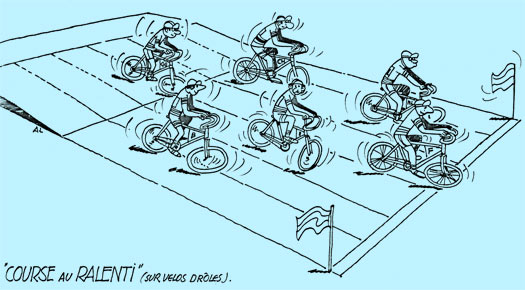 |
|
Image © RTBF, 1976 |
| |
|
Running Scores and Positions:
1st Hilvarenbeek (NL) (10pts awarded /
Joker / 18pts total) ▲
2nd Liège (B) (6pts / Joker / 17pts) ▲
3rd La Neueville (CH) (4pts / 16pts) ▼
4th Perugia (I) (1pt / 13pts) ▼
5th Thurrock (GB) (--- / 11pts) ▼
=6th Bad Füssing (D) (6pts / 10pts) ▲
=6th Agen (F) (2pts / 10pts) ▼ |
Game 5 - La Panne Séche (Push Off)
| |
|
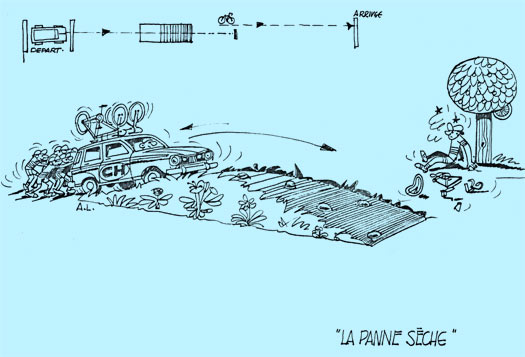 |
|
Image © RTBF, 1976 |
| |
|
Running Scores and Positions:
1st Hilvarenbeek (NL) (6pts awarded / 24pts
total) ▲
2nd La Neueville (CH) (5pts / 21pts) ▲
3rd Liège (B) (3pt / 20pts) ▼
4th Bad Füssing (D) (8pts / Joker / 18pts) ▲
=5th Thurrock (GB) (2pts / Joker / 13pts)
=5th Perugia (I) (--- / 13pts) ▼
7th Agen (F) (2pts / 12pts) ▼ |
Game 6 - Le Velo-Foot (Bike Football)
| |
|
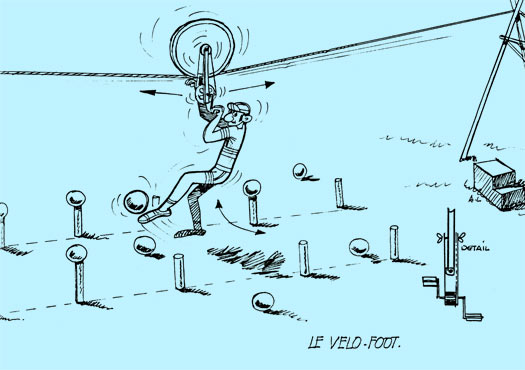 |
|
Image © RTBF, 1976 |
| |
|
Running Scores and Positions:
1st La Neueville (CH) (12pts awarded /
Joker / 33pts total) ▲
2nd Hilvarenbeek (NL) (--- / 24pts) ▼
=3rd Liège (B) (3pts / 23pts)
=3rd Bad Füssing (D) (5pts / 23pts) ▲
5th Agen (F) (8pts / Joker / 20pts) ▲
=6th Thurrock (GB) (2pts / 15pts) ▼
=6th Perugia (I) (2pts / 15pts) ▼ |
Game 7 - Le Match Poursuite (The Pursuit Match)
| |
|
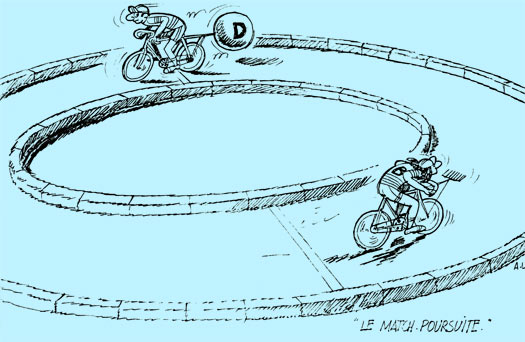 |
|
Image © RTBF, 1976 |
| |
|
Running Scores and Positions:
1st La Neueville (CH) (6pts awarded / 39pts
total)
2nd Hilvarenbeek (NL) (6pts / 30pts)
3rd Bad Füssing (D) (6pts / 29pts)
4th Agen (F) (6pts / 26pts) ▲
5th Liège (B) (--- / 23pts) ▼
=6th Thurrock (GB) (2pts / 17pts)
=6th Perugia (I) (2pts / Joker / 17pts) |
Fil Rouge - Le Jour de Repos (The Day Off)
| |
|
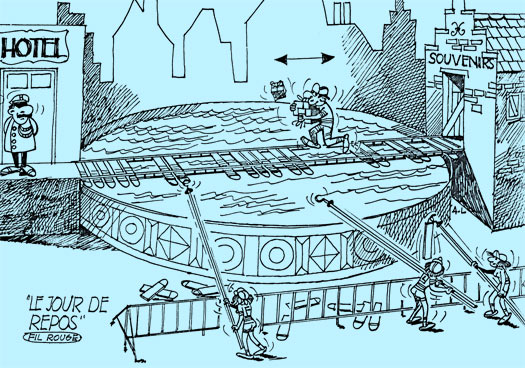 |
|
Image © RTBF, 1976 |
| |
|
Final Fil Rouge Standings:
1st Liège (B)
2nd Thurrock (GB)
3rd Hilvarenbeek (NL)
4th La Neueville (CH)
5th Bad Füssing (D)
6th Agen (F)
7th Perugia (I) |
|
Running Scores and Positions:
1st La Neueville (CH) (4pts awarded / 43pts
total)
2nd Hilvarenbeek (NL) (5pts / 35pts)
3rd Bad Füssing (D) (3pts / 32pts)
4th Liège (B) (7pts / 30pts) ▲
5th Agen (F) (2pts / 28pts) ▼
6th Thurrock (GB) (6pts / 23pts)
7th Perugia (I) (1pt / 18pts) ▼ |
Game 8 - L'Interview (Amazed!)
| |
|
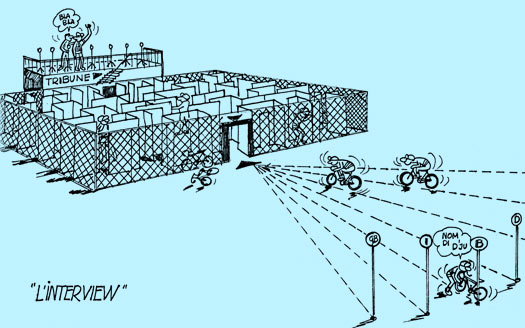 |
|
Image © RTBF, 1976 |
| |
|
Final
Scores and Positions:
1st La Neueville (CH) (2pts awarded / 45pts
total)
2nd Hilvarenbeek (NL) (5pts / 40pts)
3rd Liège (B) (6pts / 36pts) ▲
4th Bad Füssing (D) (1pt / 33pts) ▼
5th Agen (F) (3pts / 31pts)
6th Thurrock (GB) (7pts / 30pts)
7th Perugia (I) (4pts / 22pts) |
|
|
Returning
Teams and Competitors |
|
Swiss team La Neuveville were a very strong team and had, in fact won the
competition after Game 7, even before the last Fil Rouge had been played! The
team participated again when they joined forces with neighbouring town Nods in
1992. |
|
Additional Information |
|
The programme opened with the teams being led into the arena by
Le Royal Guidon Hesbignon Fanfare Cycliste de Haneffe. Comprising 50
members on bicycles (some of them on tandems), the band is located in Haneffe
in the heart of the province of Liège and is one of the most active companies
in the community. The band has played the role of ambassador for the city for
well over 100 years, with invitations to play from not only towns in Belgium
but also in France, Germany, Netherlands and the Grand Duchy of Luxembourg.
Entering the arena to some typical Belgian speciality tunes, they segued into Knees Up! Mother Brown halfway through!
British team Thurrock was very unfortunate in this heat with malfunctioning
equipment. On Game 3 - ‘Water Tandem Ride’ - a broken bicycle saddle hindered
the team in completing the course - which had also hampered the Netherlands
team - but a re-run was granted by referee Gennaro Olivieri for both teams. On
Game 6 - ‘Suspended Unicycles’ - some ‘faulty’ equipment caused the British
team to be unable to complete the course, after the suspended unicycle had
come off its wire causing the equipment to jam. However, on this occasion
Gennaro Olivieri refused a re-run stating that, “We won’t give another start
because the material is quite okay. It is up to the competitors not to put out
the bike”.
With the Dutch team Hilvarenbeek finishing in 2nd place with
40 points, they were tied with their countrymen from Pijnacker (Heat 1) in
terms of qualification for the International Final. As both teams had won
three games and come second in one each, qualification was ultimately decided
on a countback of third place finishes, with Hilvarenbeek having achieved two
to Pijnacker's one. This was the first time that an International Final
competitor had been decided in this way, although a similar happening had
occurred in 1975, again with the Dutch teams!
There was a summer break of four weeks between the staging and
recording of International Heats 4 and 5 of Jeux Sans Frontières. This
was due to the XXIst Summer Olympic Games being held in Montreal, Canada
between Saturday 17th July and Sunday 1st August 1976. This break allowed
broadcasters to carry live coverage of the events and free up technical,
administrative and presentation staff and resources for the sporting
tournament. |
|
Made
in Colour • This programme exists in the BBC Archives |
|
|
|
D |
Jeux
Sans Frontières 1976 |
Heat
6 |
|
Event Staged: Wednesday 25th August 1976
Venue:
Innerer Schloßhof (Inner Castle Courtyard), Deutschordenschloß
(Castle of the Teutonic Order), Bad Mergentheim, West Germany
European Transmissions (Local Timings):
BRT (B): Wednesday 25th August 1976, 9.05-10.20pm (Live)
SSR (CH): Wednesday 25th August 1976, 9.05-10.20pm (Live)
SRG (CH): Wednesday 25th August 1976, 9.05-10.25pm (Live)
TSI (CH): Wednesday 25th August 1976, 9.05-10.20pm (Live)
WDR 1 (D): Wednesday 25th August 1976, 9.05-10.30pm (Live)
RAI Due (I): Thursday 26th August 1976
Nederland 1 (NL): Saturday 28th August 1976, 7.05-8.40pm
RTB (B): Sunday 29th August 1976, 8.25-9.45pm
RTP (P): Saturday 4th September 1976,
9.00-10.45pm
BBC1 (GB exc. Wales): Friday 17th September 1976,
7.10-8.30pm
BBC1 Wales (CYM): Sunday 19th September 1976, 1.55-3.15pm
Winners' Trophy presented by: Erhard Keller |
|
Theme:
The Nine Ages of Man
|
|
Teams:
Geel (B) v. Brissago (CH)
v. Alsfeld (D) v. Douai (F) v.
Redcar (GB) v. Milazzo (Sicilia) (I) v. Valkenisse (Walcheren) (NL) |
|
Team Members
included:
Geel (B) -
Jan Deleur;
Brissago (CH) -
Claudio Baretta, Roberto Ciappini and Cristina Palmieri;
Alsfeld (D) -
Elke Schüßler (Co-Team Coach), Hans Georg Schüßler (Co-Team Coach), Bernd Muhl
(Team Captain), Irma Eichenauer, Ulrich Faulhaber (Reserve), Bettina Karl,
Klaus Krug, Stephan Mathies, Conny Mengel, Rüdiger Mildner, Dagmar Rüdiger
(Reserve), Herbert Rühl, Doris Scheithauer, Albert Scheuer, Hans-Erich Vogel,
Manfred Zink;
Redcar (GB) - Fred Procter (Men’s Team Captain), Denise Appleby
(Women's Team Captain), Corinne Appleton, David Bennett, Clive Birkbeck,
Marion Calvert, Jack Foster, Julie Frown, Ian Hayton, Edward Holder, Peter
Howe, Alexandra Miller, David Monroe, Alan Russell, Frank Towning, Anne
Vickers, Jeff Wright; Reserves: Linda Hirst and Ian Scott;
Valkenisse (Walcheren) (NL) - Johan Vos. |
|
Games:
Baby and Pram, Playtime on Scooters, School Time, First Loves, Marriage
Ceremony, Furnishing the Home, The Family Day Out and Finding a New Husband;
Fil Rouge: A Housewarming Party;
Jokers: Family Trees. |
|
Game Results and Standings |
|
Games |
|
Team /
Colour |
1 |
2 |
3 |
4 |
5 |
6 |
7 |
FR |
8 |
Points Scored
(Joker games shown in red) |
|
B |
3 |
4 |
5 |
5 |
--- |
6 |
10 |
6 |
7 |
|
CH |
4 |
1 |
3 |
5 |
5 |
--- |
8 |
3 |
2 |
|
D |
5 |
6 |
3 |
6 |
12 |
2 |
--- |
5 |
6 |
|
F |
--- |
5 |
6 |
2 |
2 |
1 |
6 |
2 |
5 |
|
GB |
6 |
--- |
3 |
3 |
8 |
3 |
6 |
4 |
1 |
|
I |
2 |
3 |
--- |
2 |
1 |
4 |
2 |
7 |
4 |
|
NL |
1 |
2 |
4 |
--- |
6 |
5 |
2 |
1 |
3 |
Running Totals
(Leading teams shown in red) |
|
B |
3 |
7 |
12 |
17 |
17 |
23 |
33 |
39 |
46 |
|
CH |
4 |
5 |
8 |
13 |
18 |
18 |
26 |
29 |
31 |
|
D |
5 |
11 |
14 |
20 |
32 |
34 |
34 |
39 |
45 |
|
F |
0 |
5 |
11 |
13 |
15 |
16 |
22 |
24 |
29 |
|
GB |
6 |
6 |
9 |
12 |
20 |
23 |
29 |
33 |
34 |
|
I |
2 |
5 |
5 |
7 |
8 |
12 |
14 |
21 |
25 |
|
NL |
1 |
3 |
7 |
7 |
13 |
18 |
20 |
21 |
24 |
|
|
|
Result |
Team |
Points |
Final Scoreboard |
|
1st
2nd
3rd
4th
5th
6th
7th |
B
• Geel
● ●
D • Alsfeld
GB • Redcar
CH • Brissago
F • Douai
I • Milazzo (Sicilia)
NL • Valkenisse (Walcheren) |
46
45
34
31
29
25
24 |
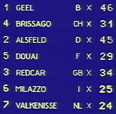 |
|
The Venue |
|
Bad Mergentheim, West Germany
This heat was held in front of the entrance to the main fortification of the
Deutschordenschloß at Bad Mergentheim. When originally built in the
12th century, the area where the games took place would have been a moat which
surrounded the castle. The castle itself was extended in the 16th century and
was used to serve as headquarters of the Teutonic Order of Knights from 1525
until the forced abolition of the order in 1809. It is a complex of buildings
built over a period of 800 years. The first buildings of the castle were
expanded in the late 16th century under Grand Master Walter von Cronberg. Over
the course of time, a representative Renaissance complex was built by
connecting the individual buildings in the inner palace courtyard to create a
closed ring of buildings. In 1574, the main architect, Blasius Berwart, also
constructed the spiral staircase between the west and north wing still famous
today. Today, the castle not only serves as the town’s main tourist
attraction, but is used to house the Deutschordensmuseum, a museum
dedicated to the Teutonic Order. |
|
The Games
in Detail |
|
Game 7 - The Family Day Out
Game 7 - ‘The Family Day Out’ - featured the hilarious Russian dolls on which
four teams chanced their Jokers, and which has been seen since on various
retrospective programmes. With four team members handcuffed together and going
head to head with two other teams through a narrow gap at the end of the
course, it was pure Jeux Sans Frontières. British commentator Stuart
Hall was once again in hysterics and could hardly speak. Although the British
team of Redcar were almost out of contention at this point, they pulled off
the biggest surprise of the night by winning this game, forcing the four teams
playing their Jokers - Belgium, Switzerland, France and Italy - to score only
10pts, 8pts, 6pts and 2pts respectively, the result of which certainly helped
their overall score.
Game 8 - Finding a New Husband
Before the last game - 'Finding a New Husband' - Belgian team Geel and West German team Alsfeld were
level on 39pts each. The final game involved a female team member having to
find a new ‘husband’. The West German girl started off quite well, but the
small Belgian girl made up ground and it came down to a very close finish. The
West German crowd believed that Alsfeld had clearly won, and were cheering and
singing. However in the background, Belgian team members could also be seen
celebrating. Then referee Gennaro Olivieri came to deliver the results with
the immortal words, “Die plätze - Belgian erste” ("The placings - Belgium is
first"), and the West German crowd fell silent and then booed loudly, whilst the
small Belgian contingency celebrated. Incidentally, this was the first Belgian
win since Ieper in 1973. |
|
Reunions |
|
Alsfeld (D)
On Saturday 5th May 2018, forty-two years after they had participated in
Spiel Ohne Grenzen and Jeux Sans Frontières, the team of Alsfeld
met up for a reunion organised by captain Bernd Muhl. The reunion took place
in the Marktplatz, where the team had been victorious over Bad Mergentheim in
the West German Domestic series all those years earlier. Sadly, not every team
member could attend as Hans Georg Schüßler and Cornelia Mengel had already
passed away and both Hansi Vogel and Elke Schüßler were living abroad. But
making a special appearance on the day was Hans Ulrich Lipphardt, Mayor of
Alsfeld (1973 to 1987). Bernd Muhl had a special surprise for everyone, when
he turned up with the Joker that he had stored in his home since 1976.
Muhl (65), then the oldest member of the team at the age of 23, remembered:
“The town of Alsfeld received over 60 applications for the team line-up. It
had to be sorted out. There was a spirit of optimism in Alsfeld when it became
known that the town could actually take part in the Spiel Ohne Grenzen
competition - and at the same time be the venue for the elimination
competition against Bad Mergentheim. A double task for the town.” It was
decided in the Town Hall to hand over the actual sports competition to sports
instructors Elke and Hans-Georg Schüßler. The organisation was carried out in
the sports hall of the Gerhart-Hauptmann school with their main task being to
put the team together. "I'll never forget that. It was almost exactly 42 years ago.
There was DM 350 for everyone," said Muhl. “So everyone had to be fit and
skilful at the same time,” he recalled. |
|
Additional Information |
|
Once again, the transmission was hit by technical difficulties
with the scoreboard - which resolutely showed Geel (B) as finishing with just
6pts instead of their winning score of 46. Before the final credits rolled,
referee Gennaro Olivieri pointed out to presenter Manfred Erdenberger that the
score for Belgium should be 46pts. Perhaps it was a bit of local sabotage...
We have corrected this anomaly on the scoreboard shown above. The team from host town Bad Mergentheim were beaten by Alsfeld in
the West German Domestic series
Spiel Ohne Grenzen and failed to earn the right to
participate in its own home heat! |
|
Made
in Colour • This programme exists in the BBC Archives
Exists in European archives |
|
|
|
NL |
Jeux
Sans Frontières 1976 |
Heat
7 |
|
Event Staged: Wednesday 8th September 1976
Venue:
Stadspark, Groningen, Netherlands
European Transmissions (Local Timings):
BRT (B): Wednesday 8th September 1976, 9.05-10.20pm (Live)
SSR (CH): Wednesday 8th September 1976, 9.05-10.25pm (Live)
SRG (CH): Wednesday 8th September 1976, 9.05-10.25pm (Live)
TSI (CH): Wednesday 8th September 1976, 9.05-10.20pm (Live)
WDR 1 (D): Wednesday 8th September 1976, 9.05-10.30pm (Live)
RAI Due (I): Thursday 9th September 1976
Nederland 1 (NL): Friday 10th September 1976, 7.05-8.40pm
RTB (B): Sunday 12th September 1976, 8.30-9.45pm
RTP (P): Saturday 18th September 1976,
9.05-10.45pm
BBC1 (GB exc. Wales): Friday 24th September 1976,
7.10-8.30pm
BBC1 Wales (CYM): Sunday 26th September 1976, 1.55-3.15pm
Winners' Trophy presented by: Barend Barendse |
|
Theme:
Customs and Excise |
|
Teams:
Aalter (B) v. Ettlingen (D) v.
Saint-Gaudens (F) v.
Liechtenstein (FL) v.
Edinburgh
(GB)
v. Silvi Marina (I) v. Groningen (NL) |
|
Games Demonstration Team: Bedum (NL) |
|
Team Members
included:
Aalter (B) - Robert Bellinder, Marc Bottebeek, Caroline de Dünke
and Rafaella Rechewelt;
Ettlingen (D) - Arnold Hubig (Team Captain), Dieter Behr, Elisabeth
Bohnenstengel, Karl Bohnenstengel, Barbara Krieg, Siegfried Ockse, Manfred
Reuter, Peter Schneider and Rune Vögel;
Saint-Gaudens (F) - Michel Burreau;
Liechtenstein (FL) - Emmanuel Vogt (Team Manager), David Vogt (Team
Captain), Martha Bühler (Team Secretary), Helmut Büchel, Paul Büchel, Erich
Bürzle, Marco Frick, Werner Frick, Ingeborg Gassner, Andreas Kaufmann, Tosca
Kindle, Georg Nigg, Gerder Schädler, Marcus Vogt, Brigitte Wolf;
Edinburgh (GB) - John Brittain, Richie Dixon, Norman Donkey,
Richard Dunn, Christine
Fowler, Andy Irvine, Charlie Jackson, Ronnie Jefferies, Susan Mackenzie, Gerry
McManus, Anna Munroe, Ray Pointing, Jenny Smith, Ronnie Smith, Ruth Watt;
Silvi Marina (I) - Annamarie Ciupissi, Gianfranco Collini and
Berrado Nicolucci. |
|
Games
(Official Titles): Visa Halen (Getting Your Visa), Deviezen-Ruil
(Exchanging Bars of Gold), Boteroverschot (Butter Surplus), Dranksmokkel van
Schip (Liquor Smuggling Off a Ship),
Diamantsmokkel (Diamond Smuggling), Sigarettensmokkel (Cigarette Smuggling,
Illegale Gresoverschrijding - Fierljeppen (Illegal Border Crossing - Dyke Jumping) and
De Douanebeambten (The Customs Officers);
Fil Rouge: Visitatie (At the Customs);
Jokers: Dutch Customs Officers. |
|
Game Results and Standings |
|
Games |
|
Team /
Colour |
1 |
2 |
3 |
4 |
5 |
6 |
7 |
FR |
8 |
Points Scored
(Joker games shown in red) |
|
B |
--- |
1 |
3 |
3 |
1 |
1 |
12 |
3 |
4 |
|
D |
5 |
12 |
--- |
5 |
2 |
5 |
3 |
5 |
5 |
|
F |
1 |
4 |
6 |
--- |
3 |
4 |
4 |
4 |
6 |
|
FL |
3 |
--- |
4 |
4 |
8 |
6 |
4 |
2 |
3 |
|
GB |
4 |
6 |
5 |
1 |
--- |
3 |
10 |
6 |
2 |
|
I |
6 |
3 |
1 |
2 |
5 |
--- |
2 |
1 |
1 |
|
NL |
2 |
2 |
4 |
6 |
6 |
2 |
--- |
7 |
7 |
Running Totals
(Leading teams shown in red) |
|
B |
0 |
1 |
4 |
7 |
8 |
9 |
21 |
24 |
28 |
|
D |
5 |
17 |
17 |
22 |
24 |
29 |
32 |
37 |
42 |
|
F |
1 |
5 |
11 |
11 |
14 |
18 |
22 |
26 |
32 |
|
FL |
3 |
3 |
7 |
11 |
19 |
25 |
29 |
31 |
34 |
|
GB |
4 |
10 |
15 |
16 |
16 |
19 |
29 |
35 |
37 |
|
I |
6 |
9 |
10 |
12 |
17 |
17 |
19 |
20 |
21 |
|
NL |
2 |
4 |
8 |
14 |
20 |
22 |
22 |
29 |
36 |
|
|
|
Result |
Team |
Points |
Final Scoreboard |
|
1st
2nd
3rd
4th
5th
6th
7th |
D
• Ettlingen
● ●
GB • Edinburgh
NL • Groningen
FL • Liechtenstein
F • Saint-Gaudens
B • Aalter
I • Silvi Marina |
42
37
36
34
32
28
21 |
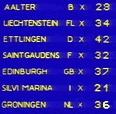 |
|
The Host
Town |
|
Groningen, Netherlands
Groningen is the capital and largest city of its
eponymous province in the north-east of the Netherlands. It has a population
of just under 200,000 inhabitants and is located 51km (31½ miles) east of
Leeuwarden, 85km (52¾ miles) north of Zwolle, 147km (91¼ miles) north-east of
Amsterdam and 35km (21¾ miles) west of the German border.
The
city was founded on the northernmost point of the Hondsrug area (a large ridge
of sand on which much of the province and neighbouring Drenthe is built).
Groningen was founded around AD 950 at the site of a Roman camp and has a rich
history, which can clearly be seen from the old medieval buildings in the
downtown area. However, the oldest document referring to Groningen's existence
only dates from 1040. In the 13th century, when the city was an important
trade centre, its inhabitants built a city wall to underline its authority.
The city had a strong influence on the surrounding lands and made its dialect
a common tongue. The most influential period of the city was the end of the
15th century, when the nearby province of Friesland was administered from
Groningen. During this period (1492), the Martinitoren (Martini Tower) in the
market square was built, which loomed over the city at a height of 97m (318ft
3in), making it the highest building in Europe at the time. The city's
independence came to an end when it chose to join forces with the Spanish
during the Eighty Years' War (1568-1648) in 1594. It later switched sides,
joining the Republic of the Seven United Netherlands.
In
1614, the University of Groningen was founded, initially only for religious
education and in the same period, the city expanded rapidly and a new city
wall was built. That same wall was tested during the Third Anglo-Dutch War
(1672-1674), when the city was attacked fiercely by the bishop of Münster,
Christoph Bernhard von Galen (1606-1678). Fortunately, the city’s wall
resisted and this event, known as Gronings Ontzet (Siege of Groningen), is
celebrated with music and fireworks on 28th August each year.
Groningen has been called the ‘World Cycling City’ because 57% of all journeys
made within the city are by bicycle and, as is the case with most Dutch
cities, it is well adapted to the high number of cyclists. A large network of
bike paths make it convenient to cycle to various destinations and, within the
city, the bicycle is the most popular means of transportation. Groningen's
nightlife depends largely on the population of students studying at Groningen
University (28,000) and the Hanze University of Applied Sciences (25,000). Its
cultural scene is vibrant and remarkable for a city of its size with the Grote
Markt, the Vismarkt, the Poelestraat and Peperstraat (the surrounding streets)
crowded every night of the week, with most bars not closing until 5.00am!
An
absolute must for any visitor to the region is an excursion to the village of
Bourtange. Located in the province of Groningen, it is actually 48km (30
miles) south-east of the city centre near the German border. Although it only
has a population of 430 inhabitants, thousand of tourists flock to the village
each year to see the star-shaped Festung (Fort) Bourtange. It was built in
1593 during the Eighty Years' War (1568-1648) when William I of Orange
(1533-1584) wanted to control the only road between Germany and the city of
Groningen which at the time was controlled by the Spanish. The fort was used
until 1851, after which it was given up and it became a normal village.
However, around 1960, living conditions in the village deteriorated to such a
state that it was decided that Bourtange would be rebuilt to its former glory
and today it is used as an open-air museum. |
|
The Venue |
|
Stadspark
This heat
in Groningen was held on playing fields which were an extension of the Stadspark
sports facility. Although the Stadspark Stadium still stands, the playing
fields no longer exist as they were covered over following the expansion of
the Martinihal in early 2000. Today the Martinihal, as well as being the home
of professional Dutch basketball club GasTerra Flames Groningen, is part of
the massive Martiniplaza shopping and fitness complex. Interestingly the area
where this heat was held is now an underground car park which itself is
covered by the regional Kamer van Koophandel (Chamber of Commerce) building.
Coincidentally, the original Martinihal was used as a staging venue for the
Dutch Domestic Series Zeskamp. |
|
Associated
Events |
|
As part of the celebrations leading up to this event,
Groningen's Grote Market (Market Square) adopted the city of Edinburgh as its
theme, inviting the Edinburgh team members, civic representatives and BBC
personnel to be the shopping centre's guests. Activities included a
sightseeing trip to Zoutkamp, a village in the municipality Het Hogeland which
is part of the Groningen province on Tuesday 7th September from 10.30am
onwards. The itinerary included a visit to a Zoutkamp fish auction and a
fish-lunch was served for all present, paid for by the Grote Markt management. |
|
The Games in Detail |
|
Game 1 - Visa Halen (Getting Your Visa)
1 heat of 6 teams simultaneously. 1 girl per team. When the
game starts the players are standing next to their passports which contain six
unstamped visas on inserts. At the other side of the area are six ticket
windows. The participants walk to the first ticket window through a narrow
aisle to stamp their visa. Next they go back to their passport and affix their
visa to it. Now they take the second insert plus visa out of their passport
and proceed to the second ticket window for stamping, and so on until all
passports are duly provided with six stamped visas. The winner is the team of
which both participants are the first to have six stamped visas in their
passport.
| |
|
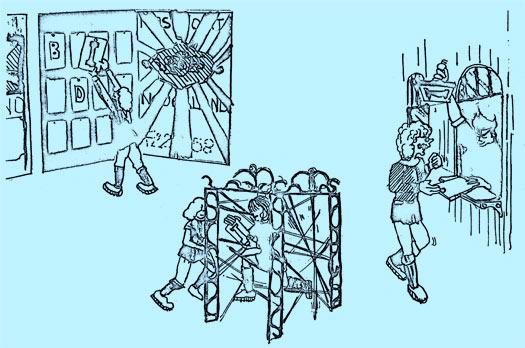 |
|
Image ©
NCRV, 1976 |
| |
|
Running Scores and Positions:
1st Silvi Marina (I) (6pts awarded / 6pts
total)
2nd Ettlingen (D) (5pts / 5pts)
3rd Edinburgh (GB) (4pts / 4pts)
4th Liechtenstein (FL) (3pts / 3pts)
5th Groningen (NL) (2pts / 2pts)
6th Saint-Gaudens (F) (1pt / 1pt)
7th Aalter (B) (--- / 0pts) |
Game 2 - Deviezen-Ruil (Exchanging Bars of Gold)
3 heats of 2 teams. Playing team consists of 4 boys, 2 girls
and the Team Captain. Opponent participant: 1 boy. On each side of the pool
are 2 boys and 1 girl. Between them is a rope that they must keep taut. In the
pool, under the rope, a customs officer of the opponent team is seated in a
boat and has very long arms. When the starting signal has been given, gold
bars are transferred from one side of the pool to the other in exchange for
coins. To do this, the participants take turns in building a human pyramid.
The customs officer in the boat tries to knock the gold bars or the coins off
the rope. The winner is the team that has succceeded in making the largest
number of objects change side within a given period of time.
| |
|
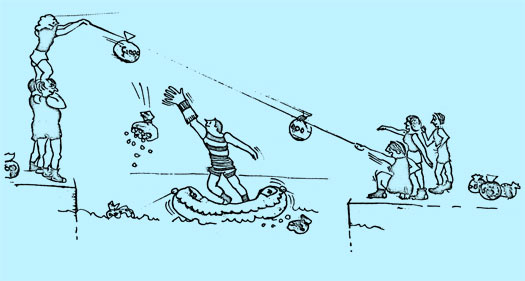 |
|
Image ©
NCRV, 1976 |
| |
|
Running Scores and Positions:
1st Ettlingen (D) (12pts awarded / Joker /
17pts total) ▲
2nd Edinburgh (GB) (6pts / 10pts) ▲
3rd Silvi Marina (I) (3pts / 9pts) ▼
4th Saint-Gaudens (F) (4pts / 5pts) ▲
5th Groningen (NL) (2pts / 4pts)
6th Liechtenstein (FL) (--- / 3pts) ▼
7th Aalter (B) (1pt / 1pt) |
Game 3 - Boteroverschot (Butter Surplus)
2 heats of 3 teams. 3 boys and 1 girl per team. At the start of
the game the participants are standing by their cart. Along the first part of
the track a number of "cartons of butter" are placed, properly interspaced, on
the side of the track. After the signal "go" one boy draws the cart, two boys
start loading up the cart, the girl does the stacking. Arrived at the
platforms provided with a barrier by way of obstacle, all cartons must be
transferred to a smaller cart, the result being a much higher load. The winner
is the team that arrives at the finish line with all "cartons of butter" on
the small cart.
| |
|
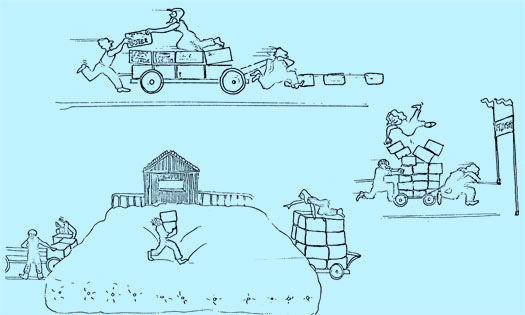 |
|
Image ©
NCRV, 1976 |
| |
|
Running Scores and Positions:
1st Ettlingen (D) (--- awarded / 17pts
total)
2nd Edinburgh (GB) (5pts / 15pts)
3rd Saint-Gaudens (F) (6pts / 11pts) ▲
4th Silvi Marina (I) (1pt / 10pts) ▼
5th Groningen (NL) (4pts / Joker / 8pts)
6th Liechtenstein (FL) (4pts / 7pts)
7th Aalter (B) (3pts / 4pts) |
Game 4 - Dranksmokkel van Schip (Liquor Smuggling Off a Ship)
3 heats of 2 teams. 2 boys and 2 girls per team plus Team
Captain. At the start of the game the first boy and girl, wearing empty chef's
hats, are standing by the ship: the girl at the bottom of the rope ladder and
the boy aboard the ship. There is a second girl on board whose job it is to
fill the chef's hats. On the whistle, the boy's hat is filled; he goes down
the rope ladder, boards a rowboat and rows to the shore. Next the girl climbs
the ladder, has her hat filled, goes to the ladder and so on. After the
players have gone ashore, they must pour the "liquor" in a transparent
container. The fourth participant of the team is constantly trying to pull the
two smugglers back on board the ship. The winner is the team that has
succeeded in bringing the largest quantity of "liquor" ashore.
| |
|
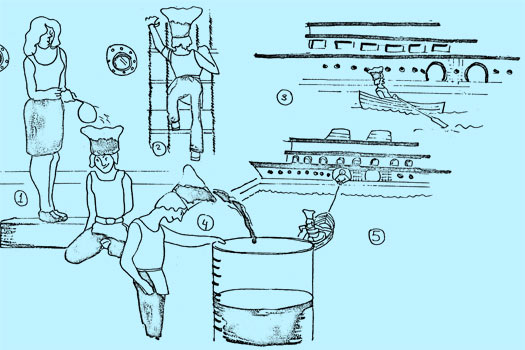 |
|
Image ©
NCRV, 1976 |
| |
|
Running Scores and Positions:
1st Ettlingen (D) (5pts awarded / 22pts
total)
2nd Edinburgh (GB) (1pt / 16pts)
3rd Groningen (NL) (6pts / 14pts) ▲
4th Silvi Marina (I) (2pts / 12pts)
=5th Saint-Gaudens (F) (6pts / 11pts) ▼
=5th Liechtenstein (FL) (4pts / 11pts) ▲
7th Aalter (B) (3pts / 7pts) |
Game 5 - Diamantsmokkel (Diamond Smuggling)
6 heats of 1 team. 1 boy per team. 2 boys and 2 girls in
opposition. The game is played on an oval shaped area with the participants
standing on one end with a cart; their pursuer is waiting at the other side.
The girl is sitting on the cart which is loaded with bags containing flour. On
the whistle, the pursuer, who is dressed up as a fat customs officer, tries to
get to the cart as fast as he can and stop it by getting hold of the grip.
When the grip is pulled, the cart is unbolted. The girl may try to hinder the
pursuer by throwing the bags (diamonds) at him. When the boy has removed the
diamond from the box and raises it the clock is stopped. The winner is the
team that needs the least time to get hold of the diamond.
| |
|
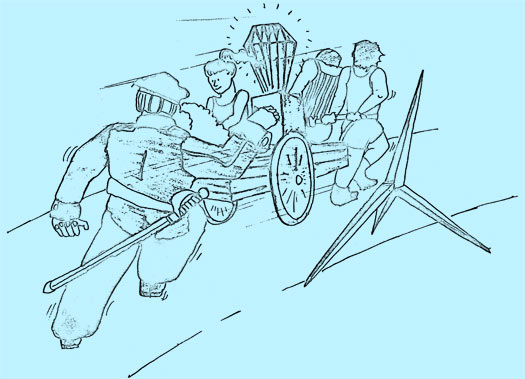 |
|
Image ©
NCRV, 1976 |
| |
|
Running Scores and Positions:
1st Ettlingen (D) (2pts awarded / 24pts
total)
2nd Groningen (NL) (6pts / 20pts) ▲
3rd Liechtenstein (FL) (8pts / Joker /
19pts) ▲
4th Silvi Marina (I) (5pts / 17pts)
5th Edinburgh (GB) (--- / 16pts) ▼
6th Saint-Gaudens (F) (3pts / 14pts) ▼
7th Aalter (B) (1pt / 8pts) |
|
Comments:
This game was originally
intended to focus on drug smuggling and would have been called
'Drug-Smokkel (Drug Smuggling)'. The change appears to have come fairly
late in the day as the games information booklet handed out to
international personnel featured the game in its original form. It is
presumed that drug trafficking was considered too adult a subject and
diamond smuggling was therefore substituted. |
Game 6 - Sigarettensmokkel (Cigarette Smuggling
3 heats of 2 teams. 2 girls and 1 boy per team. In starting
position, the two girls are standing on a shaky floating island and the boy is
on board the ship with the contraband. After the start the boy tosses the
contraband overboard, on the island or in the water where the girls try to
catch it, or recover it from the water. The winner is the team that has
collected the largest quantity of contraband in the three nets within a period
of time.
| |
|
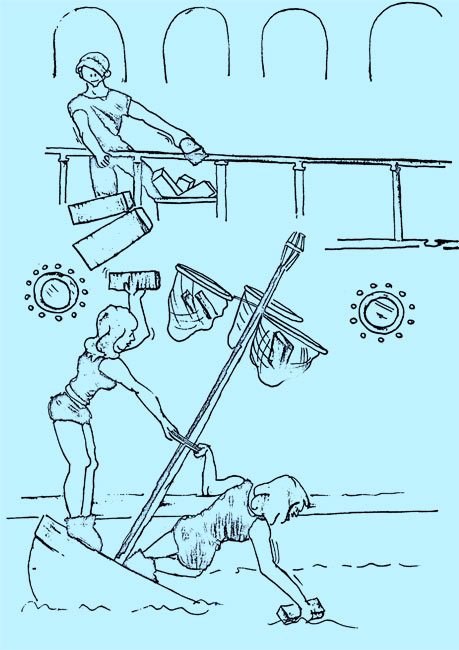 |
|
Image ©
NCRV, 1976 |
| |
|
Running Scores and Positions:
1st Ettlingen (D) (5pts awarded / 29pts
total)
2nd Liechtenstein (FL) (6pts / 25pts) ▲
3rd Groningen (NL) (2pts / 22pts) ▼
4th Edinburgh (GB) (3pts / 19pts) ▲
5th Saint-Gaudens (F) (4pts / 18pts) ▲
6th Silvi Marina (I) (--- / 17pts) ▼
7th Aalter (B) (1pt / 9pts) |
Game 7 - Illegale Gresoverschrijding - Fierljeppen
(Illegal Border Crossing - Dyke Jumping)
6 heats of 1 team. 2 boys per team. In front of an approx. 10
metre wide water-filled ditch a 15 metre long platform has been built to
enable the participants to take their run. The jumping pole is placed in the
ditch. On the whistle, the participant starts to run, jumps towards the pole,
tries to climb it and manoueuvre the pole to the far side of the ditch. The
two distances, one jumped by the boy, the other by the girl, are added
together. The winner is the team that has jumped the longest aggregate
distance.
| |
|
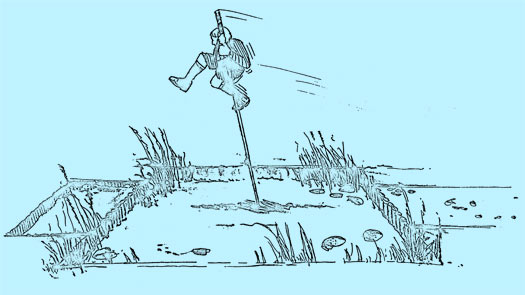 |
|
Image ©
NCRV, 1976 |
| |
|
Running Scores and Positions:
1st Ettlingen (D) (3pts awarded / 32pts
total)
=2nd Liechtenstein (FL) (4pts / 29pts) ▲
=2nd Edinburgh (GB) (10pts / Joker / 29pts) ▲
=4th Saint-Gaudens (F) (4pts / Joker / 22pts) ▲
=4th Groningen (NL) (--- / 22pts) ▼
6th Aalter (B) (12pts / Joker / 21pts) ▲
7th Silvi Marina (I) (2pts / Joker / 19pts)
▼ |
Fil Rouge - Visitatie (At the Customs)
1 boy (the customs officer) per team. 4 boys and 2 girls in
opposition. The opposition party arrives at the customs with 12 suitcases. The
total weight in the suitcases is exactly the same for all teams. The opponent
is, however, entirely free to distribute this weight over the 12 suitcases.
The playing team (the customs officer), looking over the 6 opponents, selects
the 3 suitcases he thinks are the heaviest. The participant must put the
suitcase on the scales himself. The winner is the customs officer who has
detected the 3 suitcases with the greatest combined weight.
| |
|
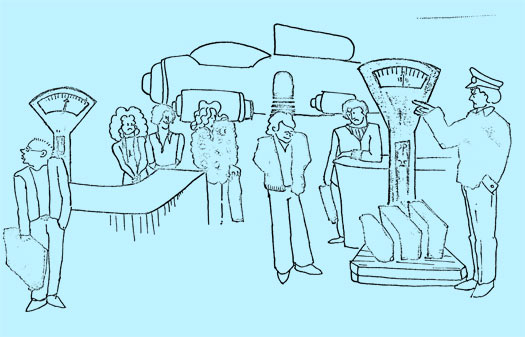 |
|
Image ©
NCRV, 1976 |
| |
The Fil Rouge in this heat was unusual in that it was a pure
guessing game. The competing team player, dressed as a customs official, had
to try and pick the three heaviest cases from a possible ten which were being
carried by opposing team members as they alighted from an aircraft. However,
the opposing team members were able to fake the weight of the two cases being
carried by using facial expressions and by the tensing of their arm muscles to
look as if the cases were heavier than they really were.
|
Final Fil Rouge Standings:
1st Groningen (NL)
2nd Edinburgh (GB)
3rd Ettlingen (D)
4th Saint-Gaudens (F)
5th Aalter (B)
6th Liechtenstein (FL)
7th Silvi Marina (I) |
|
Running Scores and Positions:
1st Ettlingen (D) (5pts awarded / 37pts
total)
2nd Edinburgh (GB) (6pts / 35pts)
3rd Liechtenstein (FL) (2pts / 31pts) ▼
4th Groningen (NL) (7pts / 29pts)
5th Saint-Gaudens (F) (4pts / 26pts) ▼
6th Aalter (B) (3pts / 24pts)
7th Silvi Marina (I) (1pt / 20pts) |
Game 8 - De Douanebeambten (The Customs Officers)
1 heat of 7 teams simultaneously. 2 boys and 2 girls per team.
A tall customs officer is seated on a large chair to which a container, partly
filled with water, is fixed. The participants are required to carry the chair
- via a number of obstacles such as a barrier and an irregular stepladder - to
a post on which a medal is hanging. Now two participants, each having a stick,
must try to remove the medal from the post and hang it on the customs officer.
When this has been achieved, the chair plus the customs officer is placed on a
pedestal. The game finishes when the chair is correctly placed on the
pedestal; a lamp lights up and illuminates the letter standing for a given
country. At the same time, a barrier with the flag of the winning country is
lifted behind the customs officer.
| |
|
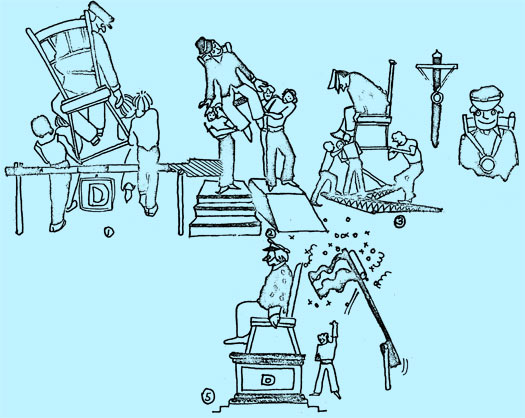 |
|
Image ©
NCRV, 1976 |
| |
|
Final
Scores and Positions:
1st Ettlingen (D) (5pts awarded / 42pts
total)
2nd Edinburgh (GB) (2pts / 37pts)
3rd Groningen (NL) (7pts / 36pts) ▲
4th Liechtenstein (FL) (3pts / 34pts) ▼
5th Saint-Gaudens (F) (6pts / 32pts)
6th Aalter (B) (4pts / 28pts)
7th Silvi Marina (I) (1pt / 21pts) |
|
Comments:
This game was titled in
production documentation as simply 'Spel Zonder Grenzen' and international
translational variations thereof, so we
have given it a more descriptive name here. |
|
|
Presenters, Officials and Production Team |
|
One of the games in this heat featured the Dutch sport of
Fierljeppen (Dyke Jumping) which involved jumping a dyke by means of a large
vaulting pole. On the game, the competitors had to run up to a pole already
‘planted’ in the dyke, jump onto it and climb it as the pole fell to the
ground, the idea being for them to land on a sanded bank on the other side.
Before the competition, BBC and NCRV commentators Stuart Hall and Dick
Passchier had had a side bet and had a go at the game themselves, the results
of which have been seen many times in the compilation programmes over the
years. |
|
Returning
Teams and Competitors |
|
For the second consecutive year, French team Saint-Gaudens
attempted to slip-in and qualify for the International Final by competing in
the seventh International Heat of the series. In 1975, they had a tall order
to try and overcome national rival Nancy’s winning score of 48pts, and could
only manage to finish in bottom place with 24pts. However before this heat
this year, the highest scoring team for France was Arbois who had finished in
third place with 36pts. But the team could not even beat this and eventually
finished in 5th place with 32pts! The team had one more attempt in the
competition when it hosted the French International Heat in 1979, but in front
of their home crowd, the team once again finished at the bottom of the heap in
8th place with just 21pts! |
|
Media
Attention |
|
The striking promotional poster artwork could be seen around
the city of Groningen in the lead-in to this Jeux Sans Frontières event
and also adorned the cover of the September 1976 Groningeragenda, a
monthly guide to events taking place in the city.
| |
|
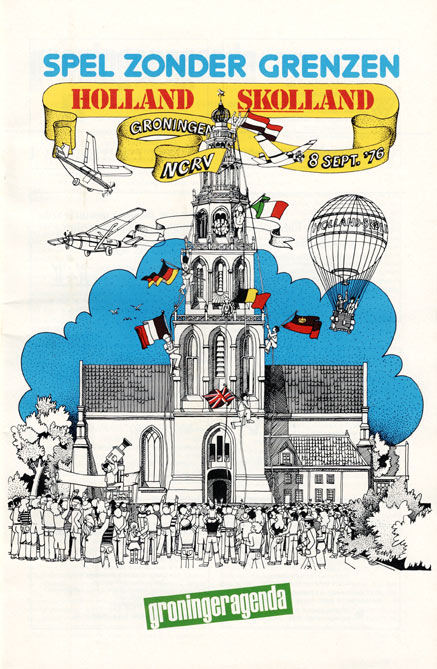 |
|
Image © Bureau Vreemdelingenverkeer,
Groningen, 1976 |
| |
|
|
Additional Information |
|
In the early stages of planning for this Dutch International Heat, the cities
of Lelystad, Raalte and Rotterdam were considered as possible locations in
addition to the eventual choice, Groningen. With no television broadcasting station of its own (TV transmissions were from
Swiss television channels), a team from the principality of Liechtenstein was
granted entry into Jeux Sans Frontières to represent itself and its
neighbours, Switzerland. They were also permitted to use their own national
registration letters of FL.
During the dress rehearsals for this Game 7 - 'Fierljeppen'
(Dyke Vaulting) - several competitors were injured and after being hit in the
face by the vaulting poles. First, an Italian team member was injured and
returned to the team hotel by ambulance. Then the Belgian and West German
competitors also sustained injuries which required the attentions of Dr Ab
Rozijn and the Red Cross. The possibility of dropping the game and replacing
it with the reserve game - a sack race - was discussed but ultimately it was
decided that it would be retained. In the final programme, the positions of
lights were changed and the poles were in different colours as it was felt
that visibility was causing the problems.
The West German team of Ettlingen had qualified for Jeux
Sans Frontières by being the highest-scoring losing team in their Domestic
series, Spiel Ohne Grenzen. Incredibly, not only did they outdo all the
opposition from the other six countries by winning this heat, but they also
outdid all their national rivals by being the only West German team to win
this year and so qualified for the International Final in Blackpool. To rub
salt in the wounds of the other West German teams, they also went on to win
the Final and lift the Golden Trophy for West Germany! |
|
Made
in Colour • This programme exists in the BBC Archives |
|
|
|
Teams
Qualifying for International Final |
|
Country |
Team |
Qualifying Heat |
Position |
Points |
|
B |
Geel |
6 |
D |
1 |
46 |
|
CH |
La
Neuveville |
5 |
B |
1 |
45 |
|
D |
Ettlingen |
7 |
NL |
1 |
42 |
|
F |
Arbois |
3 |
CH |
3 |
36 |
|
GB |
Newbury |
3 |
CH |
1 |
46 |
|
I |
Jesolo |
1 |
F |
1 |
41 |
|
NL |
Hilvarenbeek |
5 |
B |
2 |
40 |
|
|
|
|
|
GB |
Jeux
Sans Frontières 1976 |
International
Final |
|
Event Staged: Wednesday 22nd September 1976, 9.00pm
Venue:
South Shore Swimming Pool, Blackpool, Great Britain
European Transmissions (Local Timings):
BRT (B): Wednesday 22nd September 1976, 9.05-10.20pm (Live)
RTB (B): Wednesday 22nd September 1976, 9.05-10.20pm (Live)
SSR (CH): Wednesday 22nd September 1976, 9.05-10.25pm (Live)
SRG (CH): Wednesday 22nd September 1976, 9.05-10.25pm (Live)
TSI (CH): Wednesday 22nd September 1976, 9.05-10.25pm (Live)
WDR 1 (D): Wednesday 22nd September 1976, 9.05-10.30pm (Live)
RAI Due (I): Wednesday 22nd September, 10.05-11.30pm 1976 (Live - DST)
Nederland 1 (NL): Saturday 25th September 1976, 7.15-8.40pm
BBC1 (GB exc. Wales): Friday 1st October 1976, 7.05-8.30pm
RTP (P): Saturday 2nd October 1976,
9.15-10.55pm
BBC1 Wales (CYM): Sunday 3rd October 1976, 1.55-3.15pm
Winners' Trophies presented by: Derek Burrell-Davies,
Head of BBC North West |
|
Theme: Fairy
Tales and Legends |
|
Teams:
Geel (B) v. La Neuveville (CH) v. Ettlingen (D) v. Arbois (F) v.
Newbury (GB) v. Jesolo (I) v. Hilvarenbeek (NL) |
|
Team Members
included:
Geel (B) - Jan Deleur;
La Neuveville (CH) - Sylvia Constantes, Denise Mattie, Marcel
Weber;
Ettlingen (D) - Arnold Hubig (Team Captain), Dieter Behr, Elisabeth
Bohnenstengel, Karl Bohnenstengel, Barbara Krieg, Siegfried Ockse, Manfred
Reuter, Peter Schneider and Rune Vögel;
Newbury (GB) - John Norgate (Team Manager), Mike Hart (Team Coach and
Men’s Team Captain), Sue Robertson (Women's Team Captain), John Bauer, Hilary
Bowden, Timothy Cornish, Susan Grantham, Paul Heggis, Julian Hendy, Melvin
Kastelnik, Rachel King, Mark Morris, Louise O’Neill, John Rice, Wenda Rice,
Alisdair Ross, Douglas Smith, Richard Smith, Colin Street, Moyna Turner;
Jesolo (I) - Paulo Scagnetto (Team Captain), Giorgio Crema (Vice
Team Captain), Daniela Alzani, Paolo Bastianutto, Antonella Bedei,
Roberto Cedrelli, Patrizia Cicola, Mauro
Finotto, Wilma Fontana, Egle Maran, Gianni Marchesin, Rodolfo Marigonda,
Manfredo Oliveti, Mauro
Pasquali, Erminio Pieretto, Daniela Scagnetto and Pierantonio Turchetto;
Hilvarenbeek (NL) - Arve Harper, Ine Hoorsman, Nancy Pikker. |
|
Games
(Official Titles): Giants, Toadstools, Beanstalk, Golden Eggs, Down the Beanstalk,
The Treasure, Throwing Acorns, Acorns and Away to the Boats;
Fil Rouge: Escape from the Tower;
Reserve Game: Leaf Race (unused)
Jokers: Fairies with Magic Wands. |
|
Game Results and Standings |
|
Games |
|
Team /
Colour |
1 |
2 |
3 |
4 |
5 |
6 |
7 |
FR |
8 |
Points Scored
(Joker games shown in red) |
|
B |
4 |
6 |
8 |
5 |
1 |
--- |
6 |
6 |
4 |
|
CH |
6 |
4 |
--- |
3 |
12 |
4 |
4 |
7 |
1 |
|
D |
--- |
5 |
12 |
6 |
5 |
6 |
6 |
6 |
6 |
|
F |
2 |
--- |
8 |
2 |
4 |
5 |
1 |
4 |
7 |
|
GB |
3 |
3 |
5 |
1 |
3 |
4 |
--- |
3 |
5 |
|
I |
1 |
2 |
2 |
--- |
4 |
1 |
3 |
2 |
3 |
|
NL |
5 |
1 |
1 |
4 |
--- |
3 |
4 |
1 |
2 |
Running Totals
(Leading teams shown in red) |
|
B |
4 |
10 |
18 |
23 |
24 |
24 |
30 |
36 |
40 |
|
CH |
6 |
10 |
10 |
13 |
25 |
29 |
33 |
40 |
41 |
|
D |
0 |
5 |
17 |
23 |
28 |
34 |
40 |
46 |
52 |
|
F |
2 |
2 |
10 |
12 |
16 |
21 |
22 |
26 |
33 |
|
GB |
3 |
6 |
11 |
12 |
15 |
19 |
19 |
22 |
27 |
|
I |
1 |
3 |
5 |
5 |
9 |
10 |
13 |
15 |
18 |
|
NL |
5 |
6 |
7 |
11 |
11 |
14 |
18 |
19 |
21 |
|
|
|
Result |
Team |
Points |
Final Scoreboard |
|
1st
2nd
3rd
4th
5th
6th
7th |
D
• Ettlingen
●
CH • La Neuveville
●
B • Geel
●
F • Arbois
GB • Newbury
NL • Hilvarenbeek
I • Jesolo |
52
41
40
33
27
21
18 |
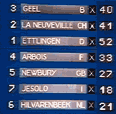 |
|
The Host
Town |
|
Blackpool,
Great Britain
Blackpool is a seaside town with 7 miles (11km) of sandy beach and a
population of around 144,000 inhabitants in the county of Lancashire. It is
located on the Irish Sea coast between the Ribble and Wyre river estuaries,
12 miles (19km) north of Southport, 14 miles (22km) north-west of Preston,
20 miles (32km) south-west of Morecambe and 61 miles (98km) west of Leeds.
In medieval times Blackpool emerged as a few farmsteads on the coast, the name
coming from "le pull", a stream that drained Marton Mere and Marton Moss into
the sea close to what is now Manchester Square. The stream ran through peat
bogs that discoloured the water, so the name for the area became "Black
Poole". The first house of any substance, Foxhall, was built toward the end of
the 17th century by Edward Tyldesley (1635-1685), the Squire of Myerscough and
son of royalist Sir Thomas Tyldesley (1612-1651).
Until the middle of the 18th century, Blackpool was simply a coastal hamlet,
but the practice of sea bathing to cure diseases was becoming fashionable
among the wealthier classes, and visitors began making the arduous trek to
Blackpool for that purpose. In 1781, Thomas Clifton (1727-1783) and Sir Henry
Hoghton (1728-1795) built a private road to Blackpool and a regular stagecoach
service from Manchester and Halifax was established. A few amenities,
including four hotels, an archery stall and bowling greens, were developed,
and the town grew slowly. The 1801 census records the town's population at 473
inhabitants.
The most significant event in the early growth of the town occurred in 1846,
with the completion of a branch line to Blackpool from Poulton on the main
Preston and Wyre Joint Railway line from Preston to Fleetwood. Around this
time, Fleetwood declined as a resort, as its founder and principal financial
backer, Peter Hesketh-Fleetwood (1801-1866), went bankrupt. In contrast,
Blackpool boomed. A sudden influx of visitors, arriving by rail, provided the
motivation for entrepreneurs to build accommodation and create new
attractions, leading to more visitors and a rapid cycle of growth throughout
the 1850s and 1860s. By 1851, the town's population had risen to over 2,500.
The growth was intensified by the practice among the Lancashire cotton mill
owners of closing the factories for a week every year to service and repair
machinery. These became known as ‘wakes weeks’. Each town's mills would close
for a different week, allowing Blackpool to manage a steady and reliable
stream of visitors over a prolonged period in the summer.
In 1863, the North Pier was completed, rapidly becoming a centre of attraction
for elite visitors. Central Pier was completed in 1868, with a theatre and a
large open-air dance floor. The town expanded southward beyond what is today
known as the Golden Mile, towards South Shore, and South Pier was completed in
1893, making Blackpool the only town in the United Kingdom with three piers.
In 1878, the Winter Gardens complex opened, incorporating ten years later the
Opera House, said to be the largest in Britain outside London.
Much of Blackpool's growth and character from the 1870s was due to the town's
pioneering use of electrical power. In 1879, it became the first municipality
in the world to have electric street lighting, as large parts of the promenade
were wired. The lighting and its accompanying pageants reinforced Blackpool's
status as the North of England's most prominent holiday resort, and its
specifically working class character. It was the forerunner of the present-day
Blackpool Illuminations. In 1885, one of the world's first electric tramways
was laid down as a conduit line running from Cocker Street to Dean Street on
the Promenade. The line was operated by the Blackpool Electric Tramway Company
until 1892 when their lease expired and Blackpool Corporation took over
running the line. A further line was added in 1895, from Manchester Square
along Lytham Road to South Shore, and the line was extended north to
Fleetwood. In 1899, the conduit system was replaced by overhead wires. The
tramway has remained in continuous service to this day and is the United
Kingdom’s only surviving first generation tramway stretching 11 miles (18km)
from the airport at Squires Gate all the way to Fleetwood.
By the 1890s, the town had a permanent population of 35,000 but could
accommodate 250,000 holidaymakers. The number of annual visitors, many staying
for a week, was estimated at three million. The decade also saw the opening of
two of the town's most prominent buildings, the Grand Theatre on Church
Street, and Blackpool Tower on the Promenade.
Documents have been found to suggest that the reason Blackpool escaped heavy
damage in World War II (1939-1945) was that Adolf Hitler (1889-1945) had
earmarked the town to remain a place of leisure after his planned invasion.
Despite this, on 11th September 1940, German bombs fell near Blackpool North
railway station and eight people were killed in nearby houses in Seed Street.
This site today is occupied by the new Town Hall offices and a Sainsbury's
supermarket. No plaque has ever been erected to remember the injured or dead.
The rise of package holidays in the late 1960s and 1970s took many of
Blackpool's traditional visitors abroad, where the weather was more reliably
warm and dry, and improved road communications, epitomised by the construction
of the M55 motorway in 1975, made Blackpool more feasible as a day trip rather
than an overnight stay. Despite this, the town’s economy, however, flourishes
relatively undiversified and firmly rooted in the tourism sector and remains
the most popular seaside resort in the country. However, the town has suffered
a serious drop in numbers of visitors which have fallen from 17 million in
1992 to 10 million today.
The three main tourist hotspots in Blackpool originally appeared as part of
the flourishing tourist industry. The first is Blackpool Tower which opened in
1894 and has been a dominant landmark of the Blackpool skyline since that
time. Inspired by the Eiffel Tower in Paris, France, it is 518ft 4in (158m) in
height (roughly half the size of its more famous original) and houses a
complex of leisure facilities, entertainment venues and restaurants, including
the world-famous Tower Ballroom and Tower Circus, at its base.
The second, Pleasure Beach Blackpool, originates back to around 1910 and
boasts rides including the Pepsi Max Big One which, between 1994 and 1996, was
the world's fastest and tallest complete circuit rollercoaster. It was the
country's most popular free attraction with 6 million visitors a year but has
lost over a million visitors since 1998 and has recently introduced a £5
entrance fee.
The third is the North Pier, the northern-most of Blackpool's three piers,
which includes a small shopping arcade, a small tramway and the North Pier
Theatre. The pier end also used to have a helicopter pad, but this was damaged
in a Christmas storm in 1997 and collapsed into the sea. |
|
The Venue |
|
South Shore
Swimming Pool
The
games at this International Final were held at the South Shore Swimming Pool adjacent to
the South Pier. This was the fourth time it had been used to
stage the International Jeux Sans Frontières competitions, as it had
previously been used to stage the British Internationals in 1967 and 1971, as
well as the International Final in 1969 (all under its original name, the
South Promenade Bathing Pool). Built in 1923, the South Promenade
Bathing Pool was affectionately referred to as Blackpool’s ‘Jewel in the
Crown’ and was frequented by the rich and famous in its early years. The
cost of building the classical-style Coliseum with its Roman pillars around
the pool alone was in the region of £75,000. Many stars of the cinema even
took time out to bathe in its beautiful surroundings which included Sir Harry
Lauder (1870-1950) in 1932 and Hollywood blonde-bombshell Jayne Mansfield
(1933-1967) in 1959, and in 1934 Associated Talking Pictures used the pool for
scenes in the Gracie Fields (1898-1967) musical Sing As We Go. Within a
year of opening the pool had attracted over 94,000 bathers and by the end of
the decade the number of visitors had totalled over nine million!
Said to have been the largest pool in the world, it was set
amongst the large promenades, nestling on the edge of golden sands within the
bracing air. The stadium received the world’s press, television and cinema, as
a result of being the venue for the Miss Blackpool and Miss World
Contests. The pool had an unusually shaped oval perimeter, the pool itself
being D-shaped, and having a concaved pageant platform. There was a ‘cut out’
for the diving boards at one end, where the depth of the water was 15ft
(4.57m). The pool area was of huge scale, approximately 376 ft long x 170ft
wide (114.6m x 51.8m). The shape necessitated a swimming events area which was
partitioned when necessary. There were of course refreshment areas and
restaurants. The diving board area was the order of the day, having 2 x 9ft 10¼in
(3m) springboards, 2 x 24ft 8in (7.5m) firm boards and a 32ft
9¾in (10m) high-board (which on windy days was claimed to have swayed!).
Sadly the pool and its buildings no longer exist. Due to its very expensive
running and maintenance costs and the trend for holidays on the continent, its viability could no longer be sustained, and was closed to the public in 1981 and demolished two years later in 1983.
The new leisure complex The Sandcastle Water Park has occupied the site since
1986. |
|
The
Rehearsals |
|
Referee Gennaro Olivieri had a slight accident during
rehearsals which resulted in one of his teeth being damaged. A quick visit to
a local dentist ultimately fixed the problem to restore his gleaming smile for
the television broadcast! |
|
The Games in Detail |
|
Game 7 - Throwing Acorns
6 heats of 1 team. 3 females per team. 5 males in opposition.
The 5 men from the opposing teams 'throw' the acorns. The girls - one at a
time - maintain their balance by the 'acorns', collect water lilies. The water
lilies will be in the water alongside the path. The winning team will be the
one that is able to collect the greatest number of water lilies in the time
allowed.
| |
|
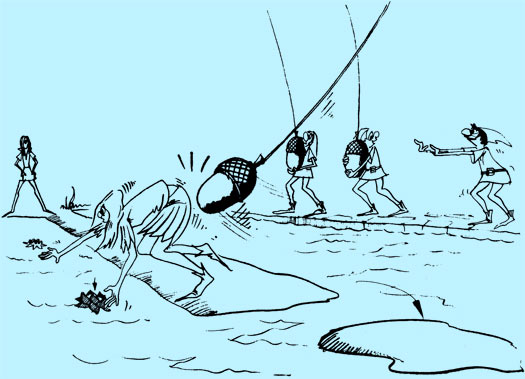 |
|
Image ©
BBC, 1976 |
| |
|
Running Scores and Positions:
1st Ettlingen (D) (6pts awarded / 40pts
total)
2nd La Neueville (CH) (4pts / 33pts)
3rd Geel (B) (6pts / 30pts)
4th Arbois (F) (1pt / 22pts)
5th Newbury (GB) (--- / 19pts)
6th Hilvarenbeek (NL) (4pts / Joker /
18pts)
7th Jesolo (I) (3pts / 13pts) |
Fil Rouge - Escape from the Tower
3 males, 1 female per team. The men take turns to jump from the
springboard so as to be able to catch the keys that the doves carry. As the
game progresses, the keys sent down the line become smaller and smaller. Each
time a key is caught it must be handed to the girl who is positioned at the
bottom of the steps. Having collected the required number of keys, the girl -
with the keys - runs up the steps of the castle and along the parapet to the
tower to free the Prince. The winning team will be the one that frees the
Prince in the shortest time.
| |
|
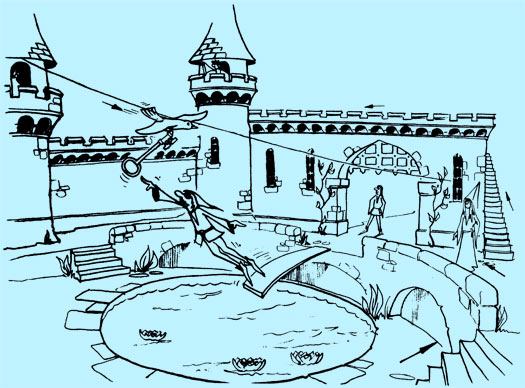 |
|
Image ©
BBC, 1976 |
| |
|
Final Fil Rouge Standings:
1st La Neueville (CH)
=2nd Geel (B)
=2nd Ettlingen (D)
4th Arbois (F)
5th Newbury (GB)
6th Jesolo (I)
7th Hilvarenbeek (NL) |
|
Running Scores and Positions:
1st Ettlingen (D) (6pts awarded / 46pts
total)
2nd La Neueville (CH) (7pts / 40pts)
3rd Geel (B) (6pts / 36pts)
4th Arbois (F) (4pts / 26pts)
5th Newbury (GB) (3pts / 22pts)
6th Hilvarenbeek (NL) (1pt / 19pts)
7th Jesolo (I) (2pts / 15pts) |
Game 8 - Away to the Boats
1 heat of 7 teams simultaneously. 2 boys and 1 girl per team.
The teams row their boats to the castle. Having reached the castle, 1 man
looks after the boat, whilst the second man climbs the beanstalk to free the
girl who is on the castle parapet. Once freed both the girl and the man climb
down the beanstalk to return to their boat. When all three are aboard they row
away from the castle and to the finish which will be an island at the far end
of the pool. The winning team will be the one that completes this in the
shortest time.
| |
|
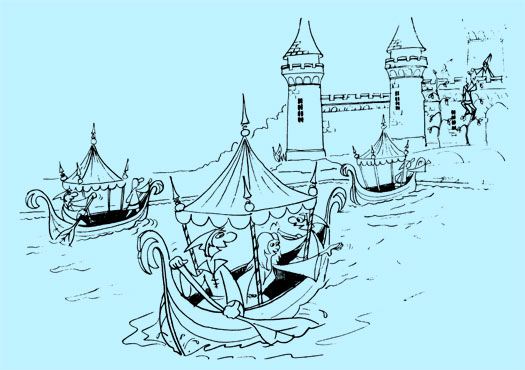 |
|
Image ©
BBC, 1976 |
| |
|
Final
Scores and Positions:
1st Ettlingen (D) (6pts awarded / 52pts
total)
2nd La Neueville (CH) (1pt / 41pts)
3rd Geel (B) (4pts / 40pts)
4th Arbois (F) (7pts / 33pts)
5th Newbury (GB) (5pts / 27pts)
6th Hilvarenbeek (NL) (2pts / 21pts)
7th Jesolo (I) (3pts / 18pts) |
|
Comments: The reserve game was called 'Leaf Race' and, had it been
used, would have involved a simple paddling race on the water with a
single competitor in each boat. These rowing boats were designed to look
like they had been fashioned from a single giant leaf. |
|
|
Additional Information |
|
The weather had proved difficult right up to about an hour before
transmission. Heavy rain had fallen over Blackpool for the previous 48 hours
and, during rehearsals, some of the games had to be altered for health and
safety reasons. On the morning of the competition, the rain and clouds had
cleared up and everything was looking fine and the games were reset to their
original design. However, just two hours before the live transmission, the
rain returned and lashed the Lancashire coast once more, and the organisers
were worried about the earlier problems encountered with the games. A decision
had to be made as to whether to change the design once more. Producer Cecil
Korer and designer Stuart Furber delayed until about 30 minutes before the
doors to the public were opened and then the rain fortunately relented. As the
crowd poured in, complete with Macintoshes, Wellington boots and umbrellas,
they were warned to take care of the slippery floors and wet seats!
Karl and Elisabeth Bohnenstengel from West Germany were father
and daughter and their surname literally means ‘beanstalk’. This would prove
an incredible coincidence in this International Final when they were drawn on
Game 5 - 'Down the Beanstalks'! Ironically, just as the Swiss team, Roche, scored the lowest ever points win
(37) in this current formula, the West German team of Ettlingen scored the
highest ever points win (52) and holds the record for winning with the second
highest percentage of available points – 92.85% (52 out of a possible 56).
Ettlingen became the first West German team to lift the Golden
Trophy in seven years, recording the country’s fifth International Final
victory to this point. |
|
Made
in Colour • This programme exists in the BBC Archives
Exists in European archives |
|
|
|
JSFnetGB Series Guide pages researched by
Alan Hayes, David Hamilton, Neil Storer, Christos Moustakas, Philippe Minet,
Sébastien Dias, Ischa Bijl, Paul Leaver and JSFnet Websites |
|
|